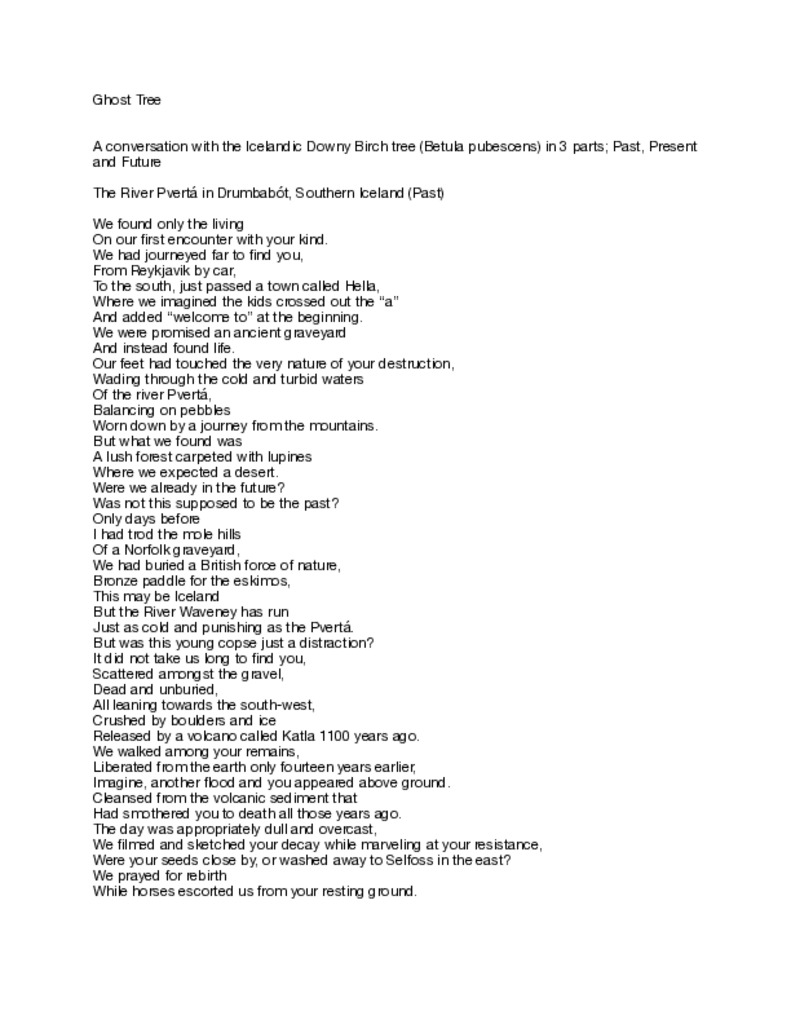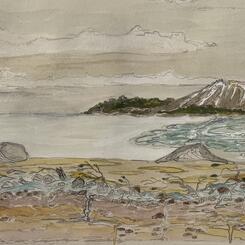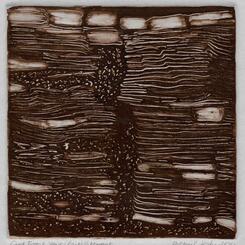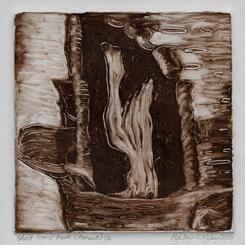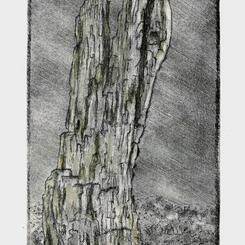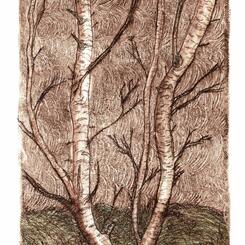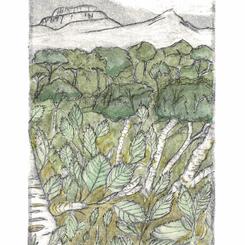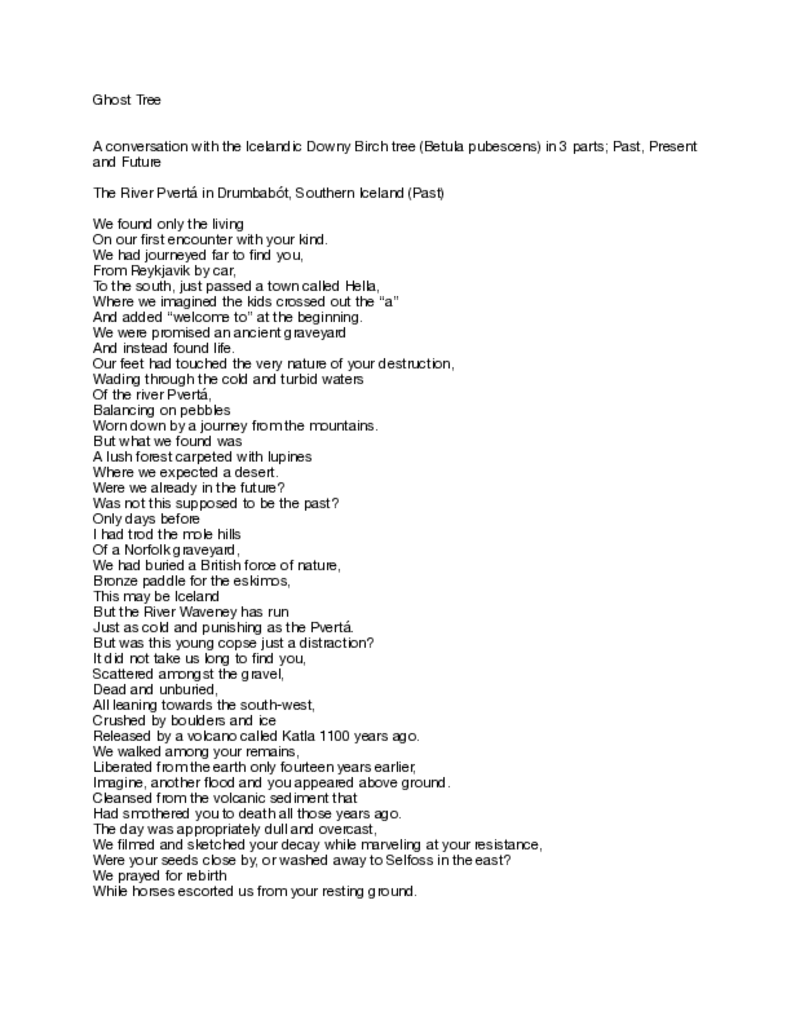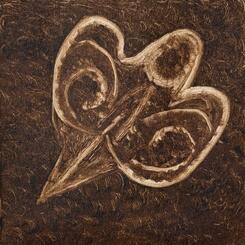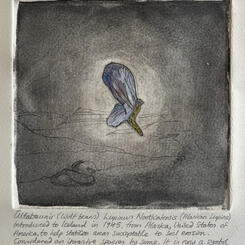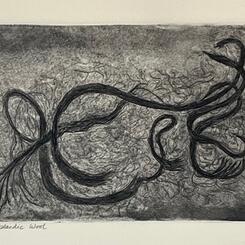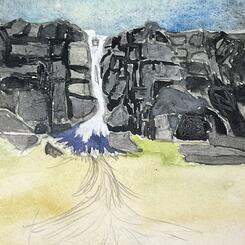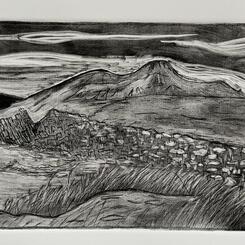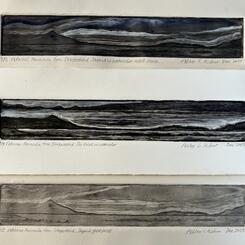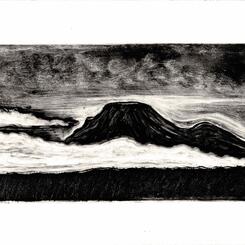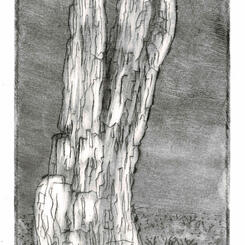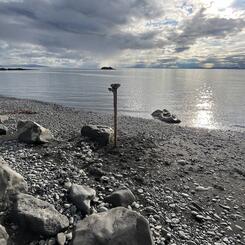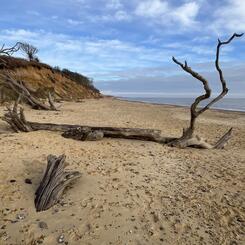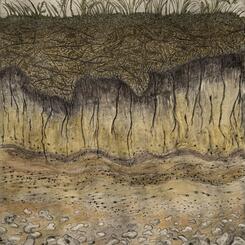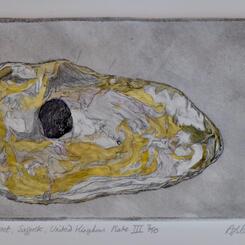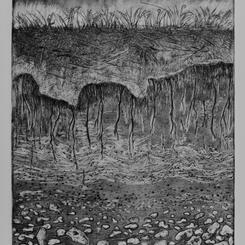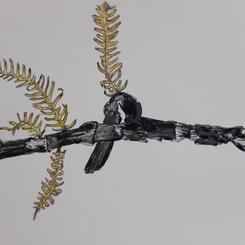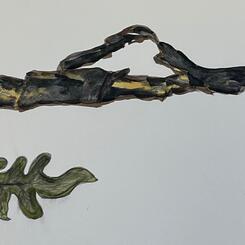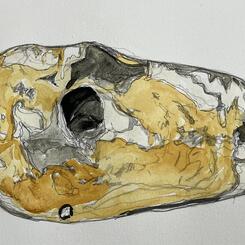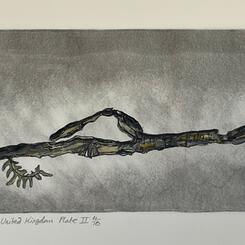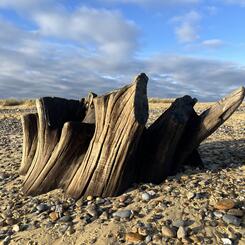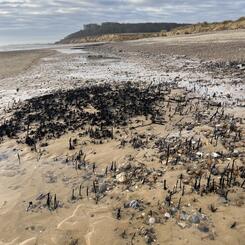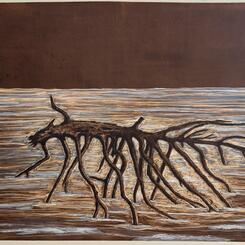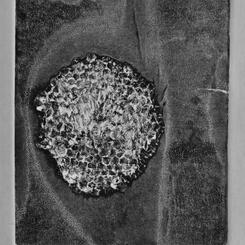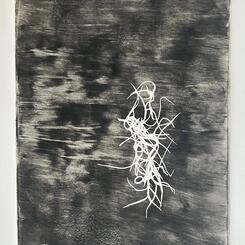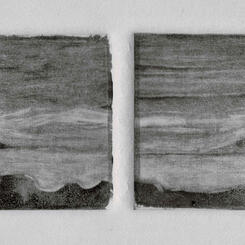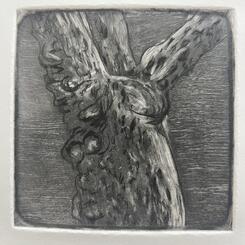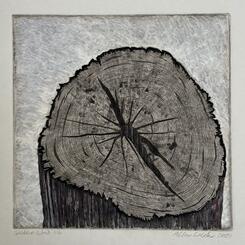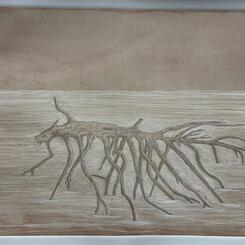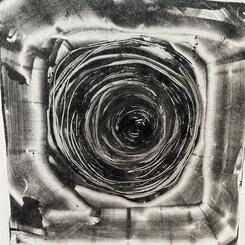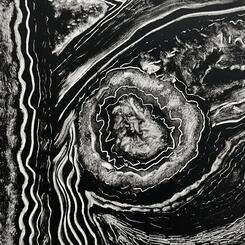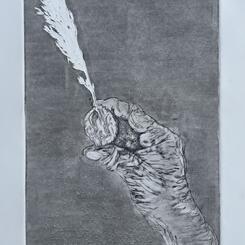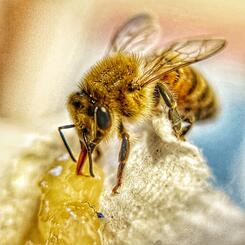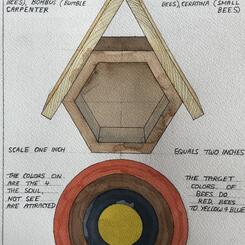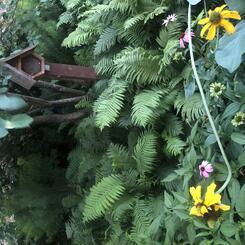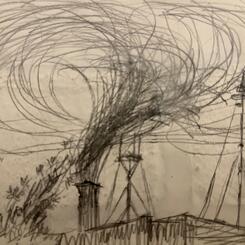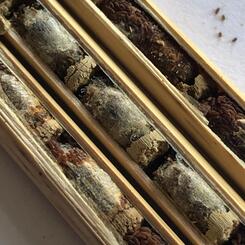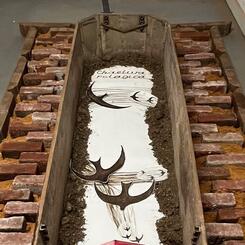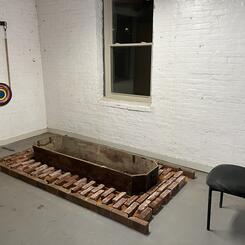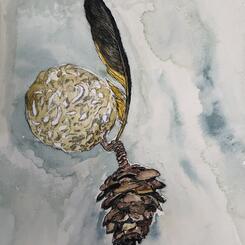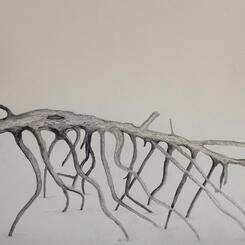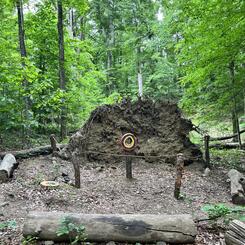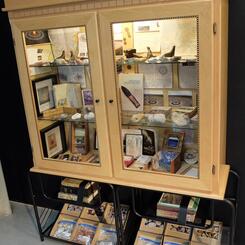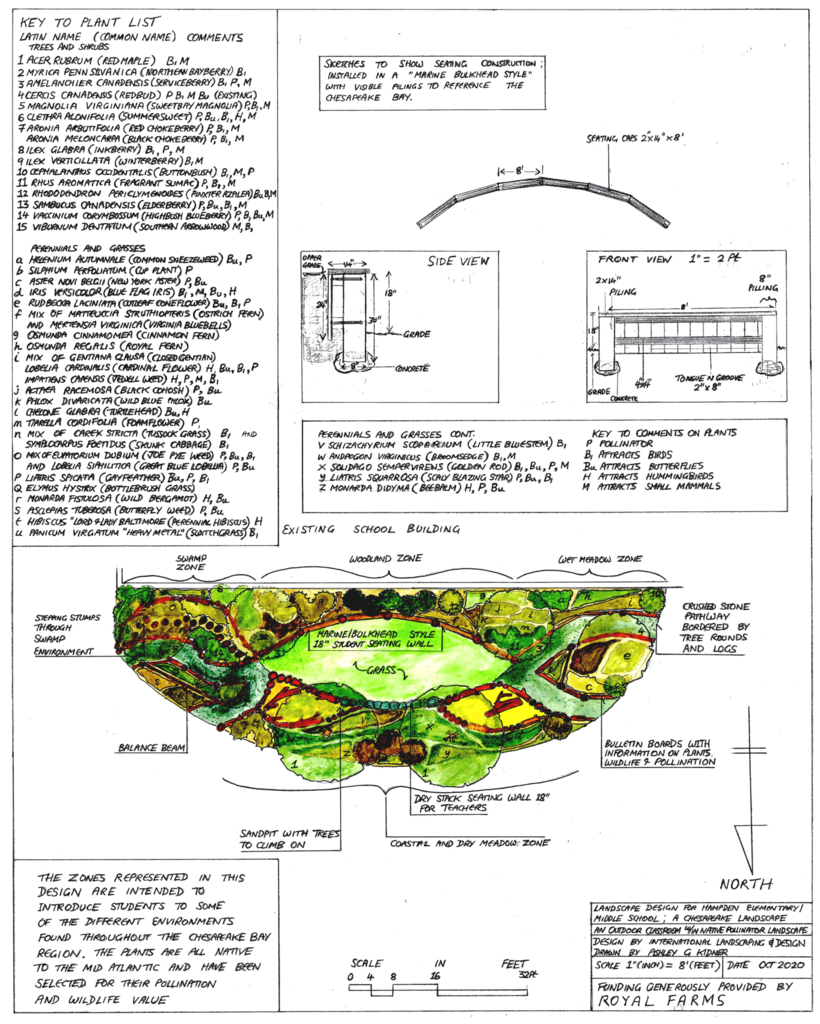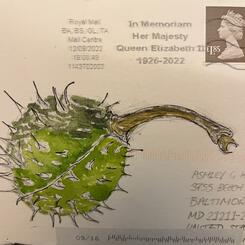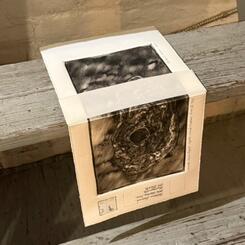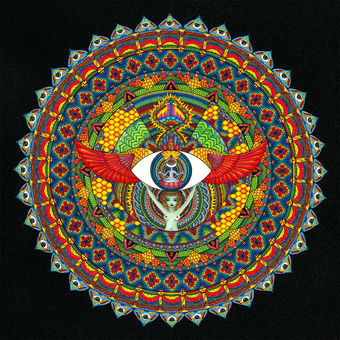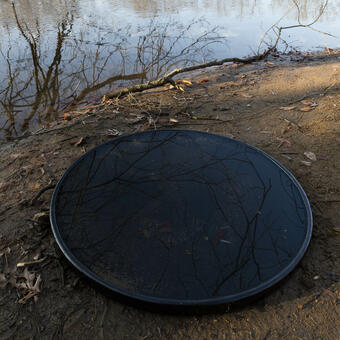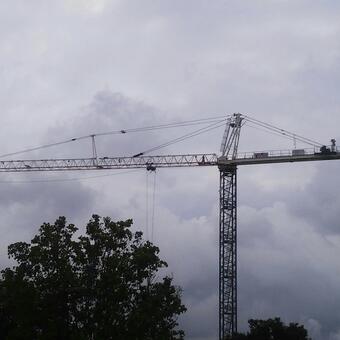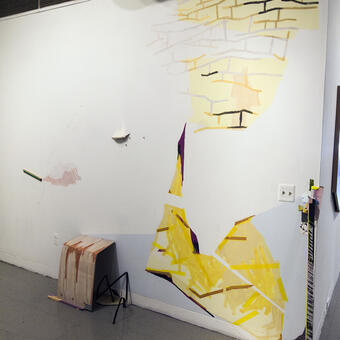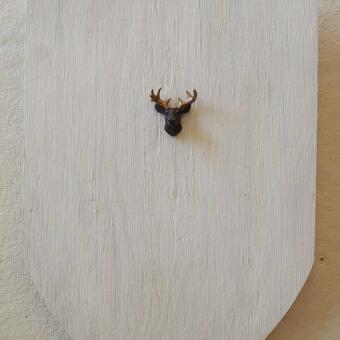Work samples
-
Blakeney Point Flint Project # 5
Installed on Blakeney Point, Norfolk, England, December 28th-31st 2007.
Circle diameter 20ft, height of cairn 3ft
Blakeney Point Flint Project #5 was the culmination of 4 previous installations (or sketches) in exactly the same location on the western side of a large sand dune just above normal high tide. Flint was collected from the surrounding area and sorted into 6 colors; white, blue, light blue, black, tan, red. The position of the cairn and henge were marked, sand was excavated from the henge to form the mound for the cairn. The different colored flints were then placed to form the outer circle (white), henge (blue) and cairn (light blue, black, tan and red). Washed up vegetation (jetsam and flotsam) were placed in the henge.
Dry driftwood was collected and used to build a fire on the top of the cairn. The installation was a homage to the Neolithic stone circles found throughout the British Iles. -
Ulfabaunir (wolf beans)
Ulfabaunir (Wolf Beans) Installation, 20ft by 35ft, 2023. Skagastrond , Iceland. Installed during my NES artist residency ,this installation was made from harvested lupine petals and local sheep's wool, installed on a basalt cliff. The work references the controversial issue of invasive species. Lupines (Lupinus nootkatensis) were imported from Alaska in 1945 to help with soil stabilization but are now considered invasive by some people. The Icelandic Sheep was originally from Norway and not native to Iceland. The installation is meant to represent a waterfall, one of many iconic Icelandic landscapes. This work was featured in a recent exhibition curated by Katie lone Craney entitled Dis/Comfort in the North, here is the link to the catalogue.
-
 Covehithe Erosion Project
Covehithe Erosion ProjectDry point on paper with watercolor, pencil and ink, 20"by16", 2025. This project examines the constant coastal erosion of the sandy cliffs in Covehithe, Suffolk, UK. As a kid I used to swim in the North Sea from this beach. Back in the mid 70's the road which passes Covehithe Abbey on it's way down to the beach ended into the sea and the erosion still continues today at an alarming rate, hastened by global warming, sea-level rise and destructive storms.
Available for Purchase -
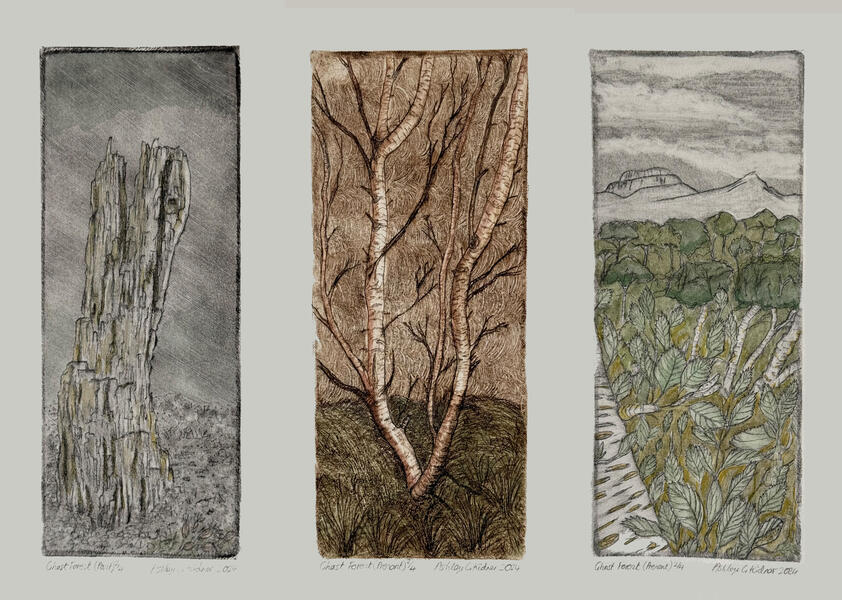 Rebirch: Awakening of a Ghost Forest
Rebirch: Awakening of a Ghost ForestDry point on paper with watercolor,15" by 27", Tryptic. The rebirch project was conceived and started by Ashley G Kidner and Guido Hundrup in the weeks before their second Artist Residency at NES in Skagaströnd, Northern Iceland. A multidisciplinary artwork that includes video installations, printmaking, musical compositions, sketches, soundscapes, and poetry. The project examines forestation in Iceland, with a focus on birch trees, particularly the downey birch (Betula pubescens), through past, present, and future contexts. The resulting artwork was inspired by 3 studies of forests (all containing birch trees), both living and dead, in southern and northern Iceland. The work is intended to ask questions about man's interruptions in nature and how that affects our views of the landscape, from an environmental, artistic, and economic perspective.
About ashley
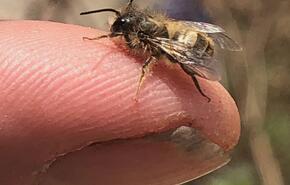
Ashley Kidner is a Baltimore-based environmental artist. Kidner’s work reflects issues such as global warming, habitat loss, sea level rise, and the decline of pollinators. In the studio, Kidner works in a range of mediums, including printmaking, watercolors, and encaustic. When creating earth work installations around the world, Kidner likes to work with natural materials like stone, wood, plants, and water.
In addition to environmental artwork Kidner has worked in landscaping for… more
Rebirch: Awakening of a ghost forest
The Project
The rebirch project was conceived and started by Ashley G Kidner and Guido Hundrup in the weeks before their second Artist Residency at NES in Skagaströnd, Northern Iceland in 2024. A multidisciplinary artwork that includes video installations, printmaking, musical compositions, sketches, soundscapes, and poetry. The project examines forestation in Iceland, with a focus on birch trees, particularly the downey birch (Betula pubescens), through past, present, and future contexts. The resulting artwork was inspired by 3 studies of forests (all containing birch trees), both living and dead, in southern and northern Iceland. The work is intended to ask questions about man's interruptions in nature and how that affects our views of the landscape, from an environmental, artistic, and economic perspective.
The sites; Past , Present and Future. While visiting these 3 sites the artists recorded sound and video along with written and visual notations.
PAST: In the past section of the project, the artists visited the ancient birch forest remains at Drumbabót in southern Iceland. Around 823 CE, the nearby volcano Katla erupted, releasing glacial floods known as a jökulhlaup, which destroyed and buried approximately 2,000 hectares of mature birch forest. Some of the trees were estimated to be 70-100 years old and up to 1ft in diameter. In the spring of 2003, the River Pverá flooded, exposing hundreds of ghostly stumps; twisted, distorted, and all leaning towards the south-west. These remains inspired a part of the project title. This "ghost forest" gives evidence that Iceland was heavily forested when the first settlers arrived around fifty years later. In studying the birch remains at Drumbaböt, the artists were able to reflect on natural destruction and preservation of forests in Iceland before man's influence on the landscape.
PRESENT: The present section of the project involved observing the woods at Kjarnaskögur, a recreational area with a large and diverse selection of flora, including numerous downy birch trees. Many of these birch trees were planted within the last 50 years to create an attractive environment for recreational use by Akureyri locals: the forest contains walking and biking trails along with camping sites. The location provided the artists an opportunity to observe a mature replanted forest where humans are encouraged to interact with nature thus defining the site as the present.
FUTURE: For the future section of the project the artists selected the recently planted forest on the slopes of the Spákonufell mountain close to the NES residency in Skagaströnd, which was part of the Seer Hill project initiated by the One Tree Planted group in 2021. This was an opportunity for the artists to observe a newly planted forest with native trees including Downy Birch, Sitka spruce and black cottonwood. The artists were able to contemplate a future forest that was planted to give protection from soil erosion and the harsh Icelandic climate and also provide a recreational area for the people of Skagaströnd.
-
 Jokulhlaup at Drumbabot
Jokulhlaup at DrumbabotDry point, watercolor, pencil and ink on Paper, 12" by 6", 2026. This painting depicts an event that happened 1200 years ago, when a volcano called Katla erupted into a glacier, causing catastrophic flooding, destroying a mature birch forest in southern Iceland. The event is called a Jokulhlaup, and the remains of the birch trees can be found at Drumbabot.
-
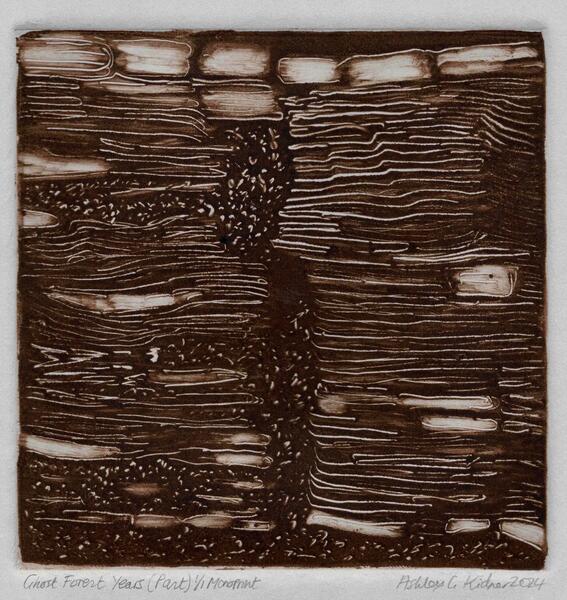 Ghost Forest Years (Past) 2024
Ghost Forest Years (Past) 2024 -
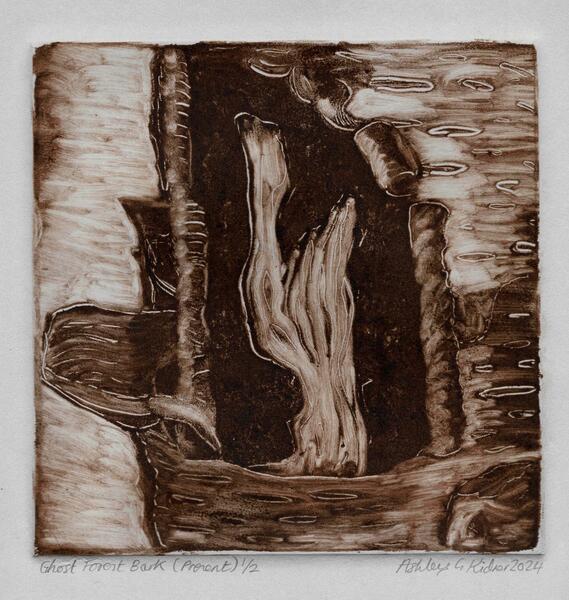 Ghost Forest bark (present) 2024
Ghost Forest bark (present) 2024 -
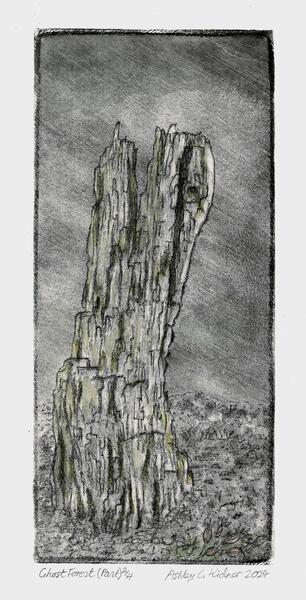 Ghost Forest (Past), 2024
Ghost Forest (Past), 2024Drypoint with watercolor, 10" by 16"
-
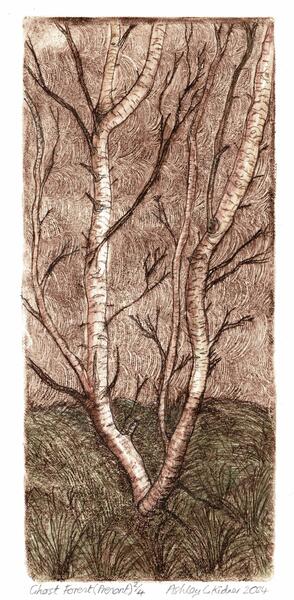 Ghost Forest (Present), 2024
Ghost Forest (Present), 2024Drypoint with watercolor, 10" by 16"
-
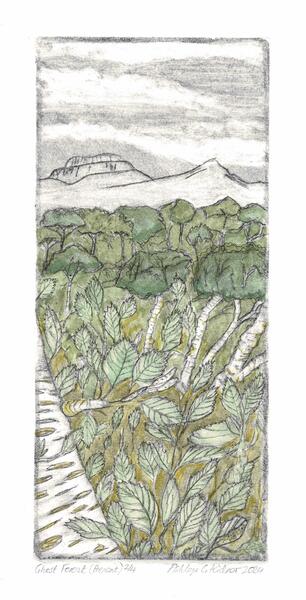 Ghost Forest (Future), 2024
Ghost Forest (Future), 2024Drypoint with watercolor, 10" by 16",
-
PERPETUUM INCUBATOR (Rebirch: Awakening of a Ghost Forest Project)
This video presents a segment of "Rebirch: Awakening of a Ghost Forest" by Ashley G Kidner and Guido Hundrup, created during their monthlong residency at NES in Skagaströnd, northern Iceland. Combining landscaping, video, sketches, prints, found objects, and sculptures, the work examines Icelandic forestation—with a focus on the native Betula pubescens—across past, present, and future.
-
Rebirch: Awakening of a ghost forest (Video trailer) by Guido Hundrup
This video presents an excerpt from a video installation for "Rebirch: Awakening of a Ghost Forest." Developed by Ashley G Kidner and Guido Hundrup during their month-long residency at NES in Skagaströnd, northern Iceland, the project combines elements of landscaping, video, sketches, prints, found objects, and sculptures. At its core, the work examines Iceland's forestation—focusing on the native Betula pubescens (downy birch)—across the past, present, and future.
-
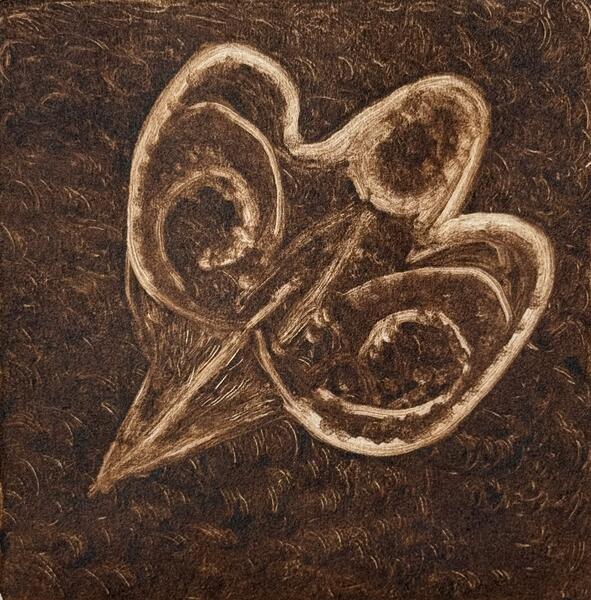 Ghost Forest seed (Future), 2024 Monoprint on paper, 10" by16", 2024
Ghost Forest seed (Future), 2024 Monoprint on paper, 10" by16", 2024
NES artist residency in Skagastrond, Iceland (July 2023 and 2024)
This project includes work I produced while at my artist residency at NES in Skagastrond, north western Iceland in July of 2023 and 2024. The main part of my work there in 2023 was the installation called Ulfabaunir (wolf beans) which is described in the work sample section. I also did a number of drypoint prints (from plexiglass plates) and watercolors, mainly landscape studies.
-
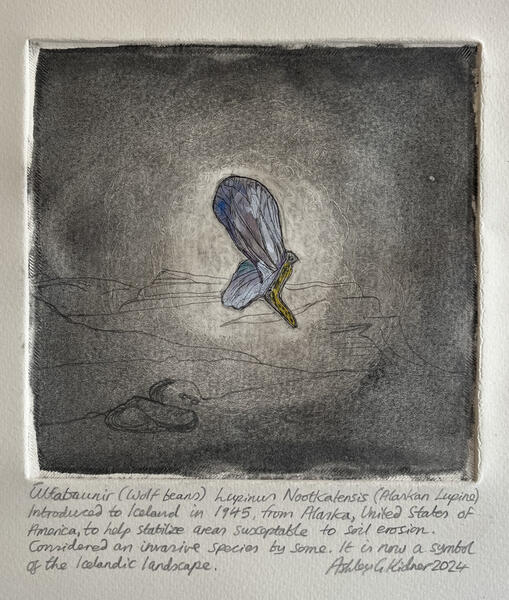 Ulfabaunir (wolf beans)
Ulfabaunir (wolf beans)Drypoint with pencil, watercolor and ink, 10' by10", 2025
-
 Ulfabaunir (Wolf beans) Triptych
Ulfabaunir (Wolf beans) TriptychDrypoint with watercolor on paper, 12" by 28"
-
Ulfabaunir (Wolf Beans) Installation
Ulfabaunir (Wolf Beans) Installation, 20ft by 35ft, 2023. Skagastrond , Iceland.
-
Ulfabaunir (wolf beans)
Ulfabaunir (Wolf Beans) Installation, 20ft by 35ft, 2023. Skagastrond , Iceland. Installed during my NES artist residency ,this installation was made from harvested lupine petals and local sheep's wool, installed on a basalt cliff. The work references the controversial issue of invasive species. Lupines (Lupinus nootkatensis) were imported from Alaska in 1945 to help with soil stabilization but are now considered invasive by some people. The Icelandic Sheep was originally from Norway and not native to Iceland. The installation is meant to represent a waterfall, one of many iconic Icelandic landscapes. This work was featured in a recent exhibition curated by Katie lone Craney entitled Dis/Comfort in the North, here is the link to the catalogue.
-
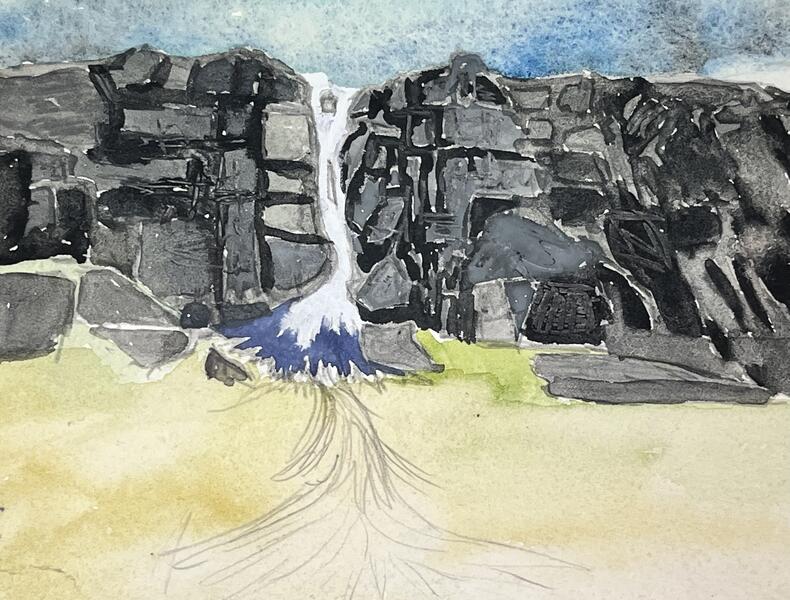 Sketch for Ulfabaunir (wolf beans ) installation
Sketch for Ulfabaunir (wolf beans ) installationSketch for Ulfabaunir (wolf beans ) installation, watercolor 3" by 5"
-
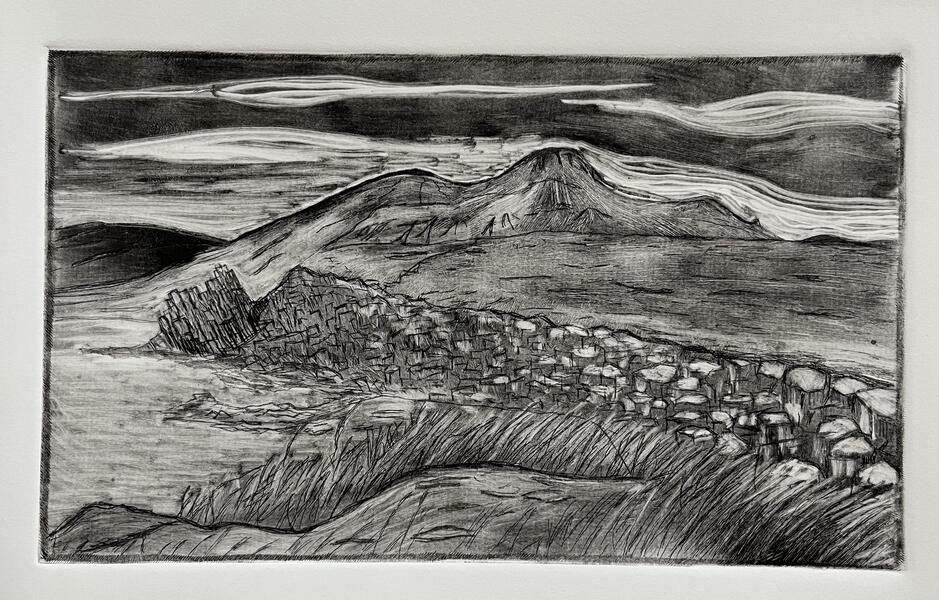 The Sphinx
The SphinxDrypoint on paper, 10" by 16"
-
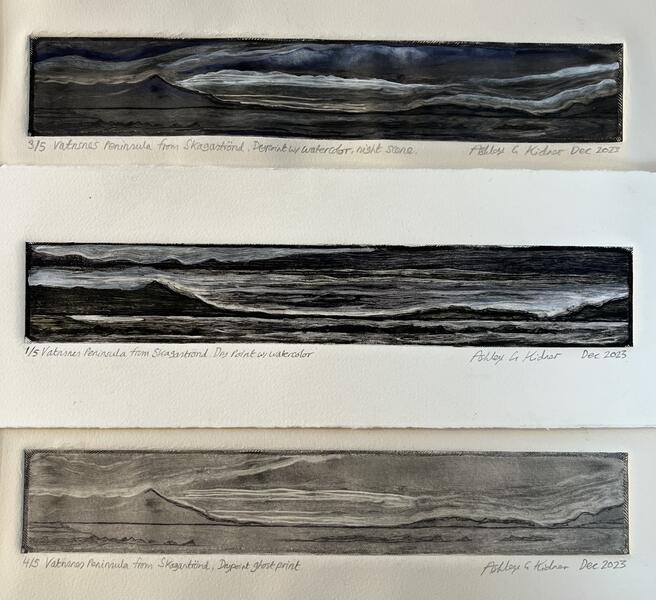 Landscape from studio
Landscape from studioDrypoint on paper with watercolor, 12" by 3"
-
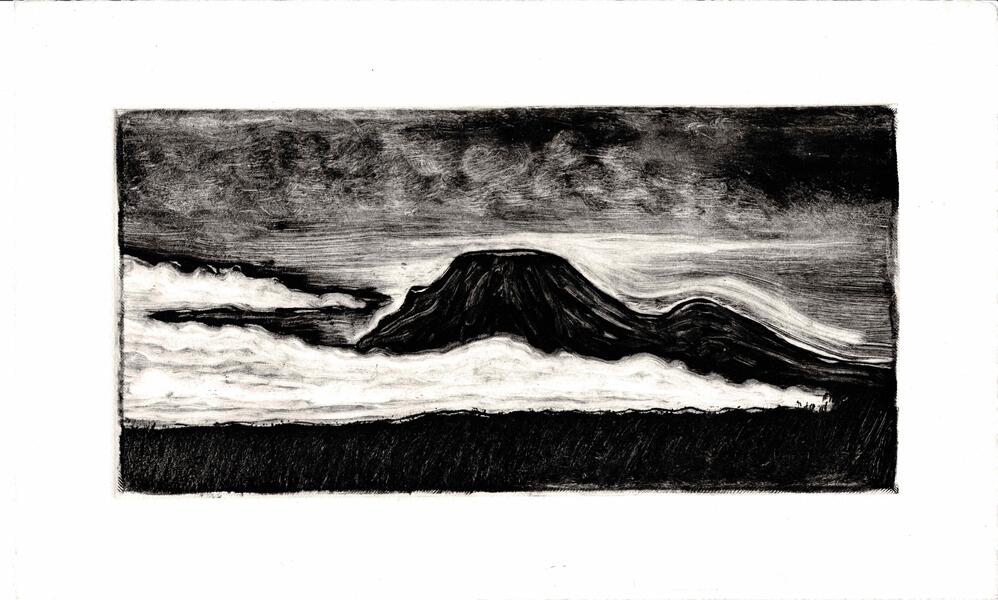 The Prophetess Mountain
The Prophetess MountainThe Prophetess Mountain; Spakonufell from Skagastrond, mono print, 16" by 10"
Available for Purchase$250
-
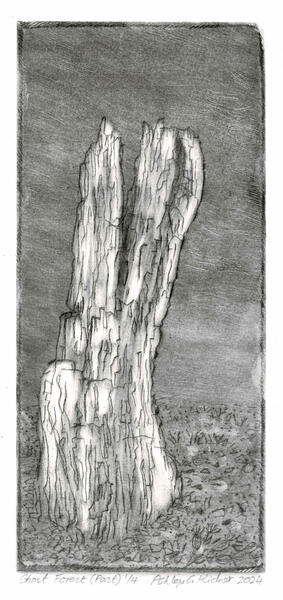 Ghost Forest (past)
Ghost Forest (past)Monoprint on paper, 16" by 10", Depicting the 1100 year old remains of birch trees found at Drumbabot in Southern Iceland.
-
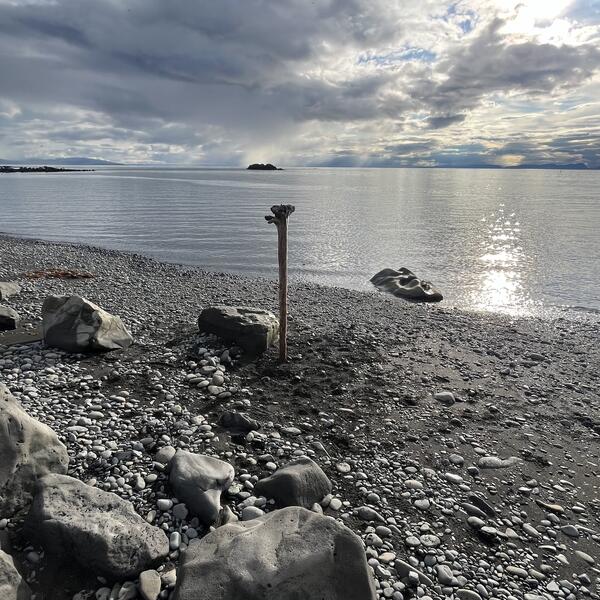 Siberian passage
Siberian passageInstallation on the beach in Skagastrond; Driftwood, most likely from Siberia.
Covehithe Erosion Project
Photographic documentation, sketching, mono and drypoint prints, watercolors. 2022-2025. This project examines the constant coastal erosion of the sandy cliffs in Covehithe, Suffolk, UK. As a kid I used to swim in the North Sea from this beach. Even then the road which passes Covehithe Abbey on it's way down to the beach ended into the sea and the erosion continues today at an alarming rate, hastened by global warming, sea-level rise and destructive storms.
-
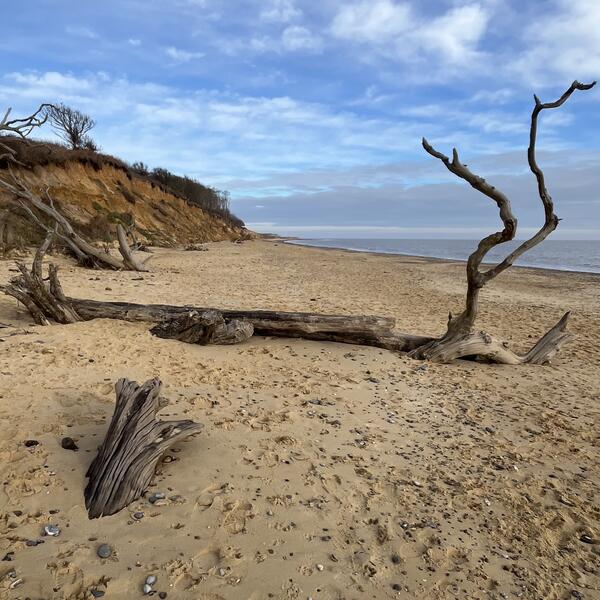 Covehithe Erosion Project
Covehithe Erosion ProjectPhotograph showing recent erosion at Covehithe in January 2025
-
 Covehithe Erosion Project, Plate 1
Covehithe Erosion Project, Plate 1
Dry point on paper with watercolor, pencil and ink, 20"by16", 2025. This project examines the constant coastal erosion of the sandy cliffs in Covehithe, Suffolk, UK. As a kid I used to swim in the North Sea from this beach. Back in the mid 70's the road which passes Covehithe Abbey on it's way down to the beach ended into the sea and the erosion still continues today at an alarming rate, hastened by global warming, sea-level rise and destructive storms. -
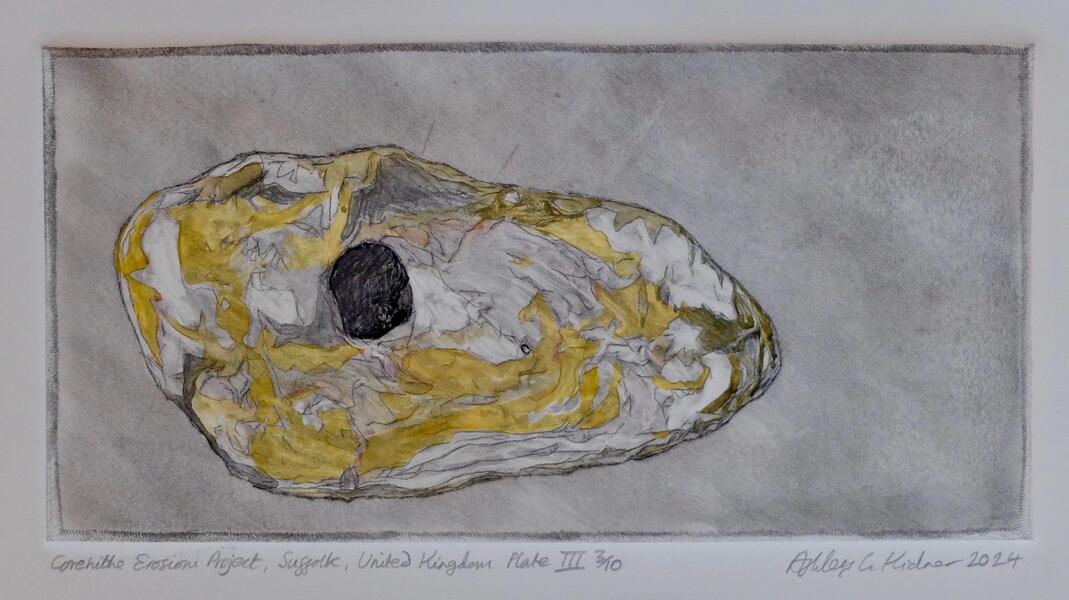 Covehithe Erosion Project
Covehithe Erosion ProjectDrypoint, watercolor, pencil and ink on paper, 14" by 22", 2024
-
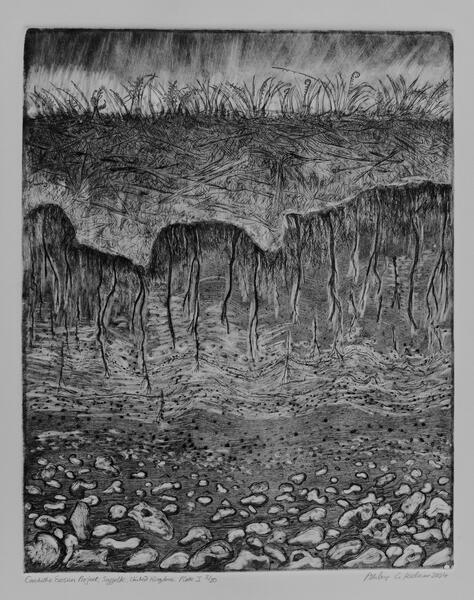 Covehithe Erosion Project
Covehithe Erosion ProjectDrypoint with ink on paper, 16" by 24", 2024
-
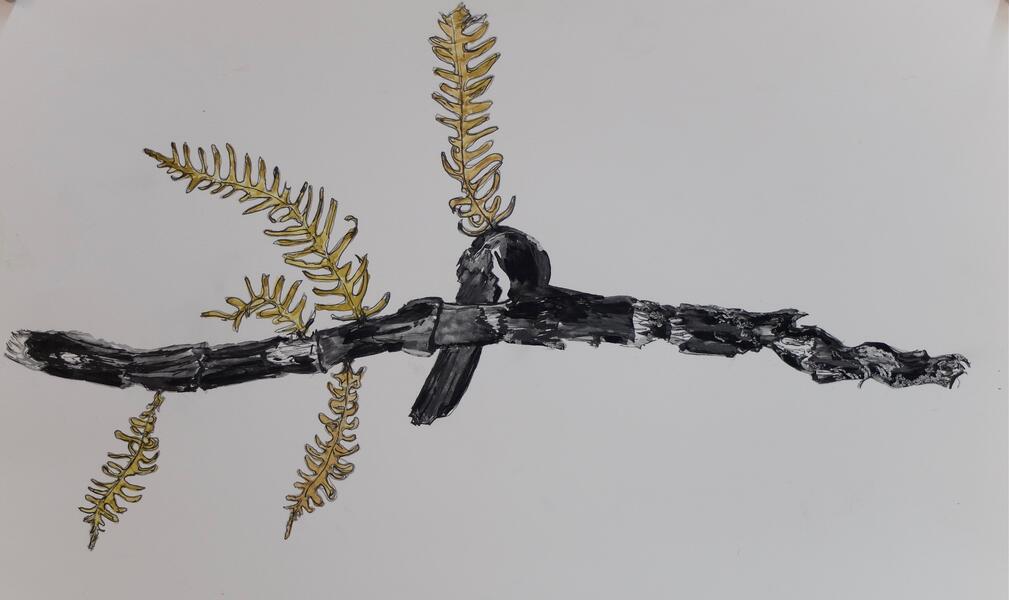 Covehithe Erosion Project
Covehithe Erosion ProjectWatercolor, pencil and ink on paper, 15" by 10"
-
 Covehithe Erosion Project
Covehithe Erosion ProjectWatercolor, Pencil and ink on paper, 8" by 17"
-
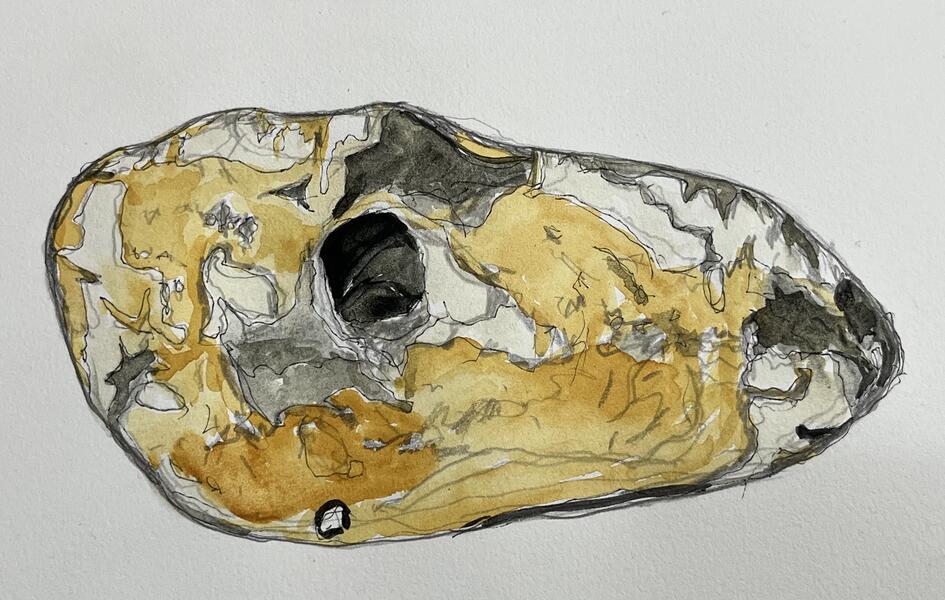 Covehithe Erosion project
Covehithe Erosion project -
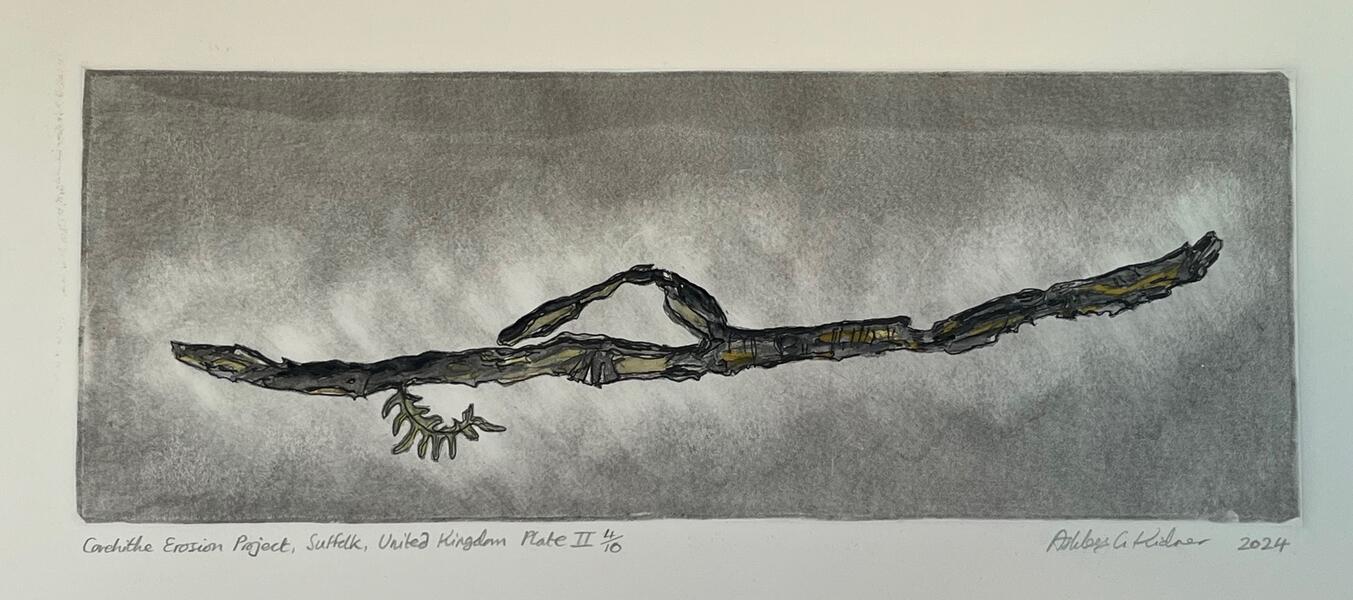 Covehithe Erosion project
Covehithe Erosion project -
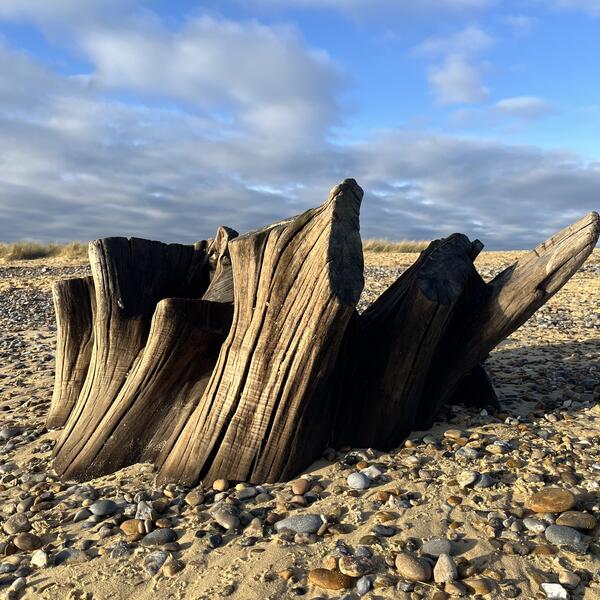 Covehithe Erosion Project
Covehithe Erosion ProjectPhotograph showing old tree fallen from cliff and sculpted by wave action
-
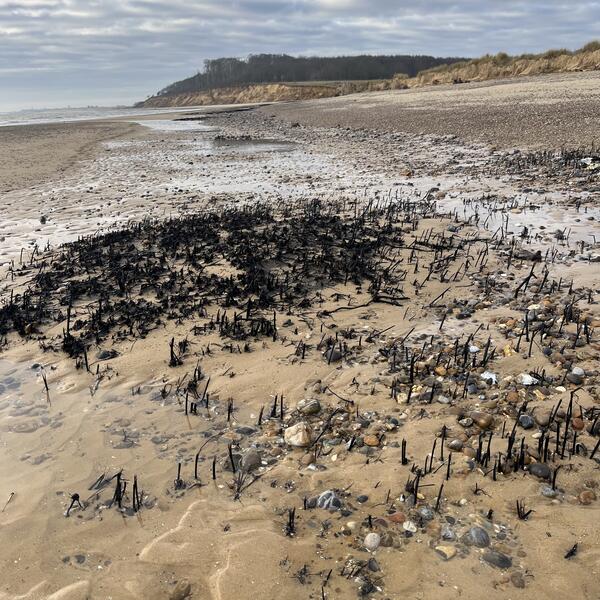 Covehithe Ersion Project
Covehithe Ersion ProjectPhotograph showing bracken fern (Pteridium aquiline) barely alive, mostly dead, buried in the sand, ripped from the cliff only 30ft away.
Prints
This section contains works on paper produced by printmaking, such as drypoint and mono prints and monotype.
-
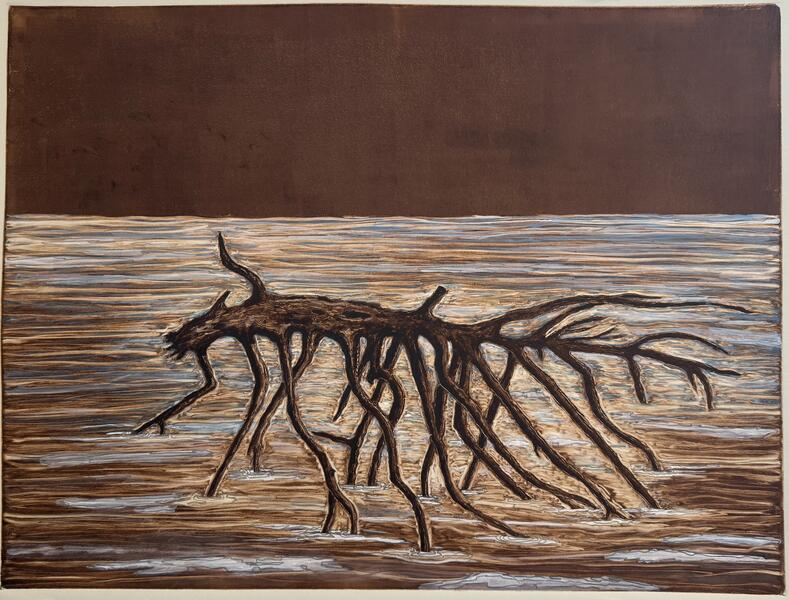 Hambleton Island Project
Hambleton Island ProjectMonoprint with watercolor, pencil, 22" by 16" 2025
-
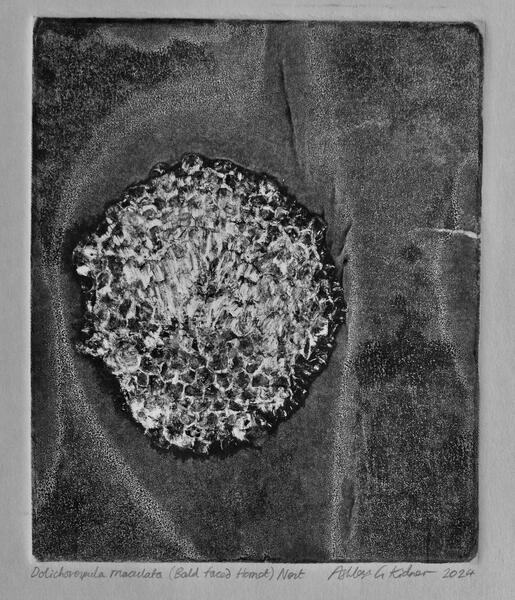 Dolichovespula maculata (Bald faced hornet nest) 2024
Dolichovespula maculata (Bald faced hornet nest) 2024Ghost Print after nest remnants were put through the press, 10" by 16", ink on paper
Available for PurchaseUnframed print $225
-
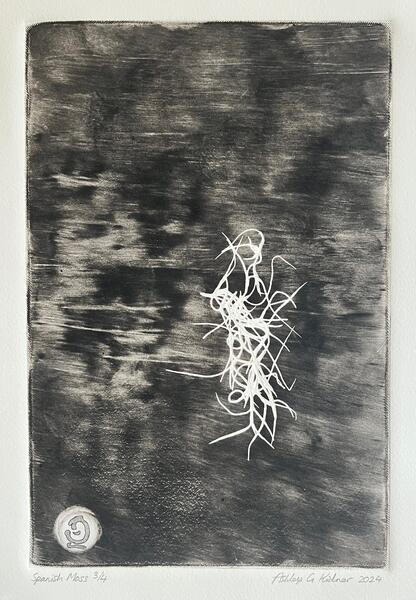 Spanish Moss
Spanish MossMonoprint with digital polaroid, watercolor and pencil. 14" by22". 2024
-
 Time Unkown in Skagastrond, 2024
Time Unkown in Skagastrond, 2024Mono print with 2 plates, 6" by16", 2024
-
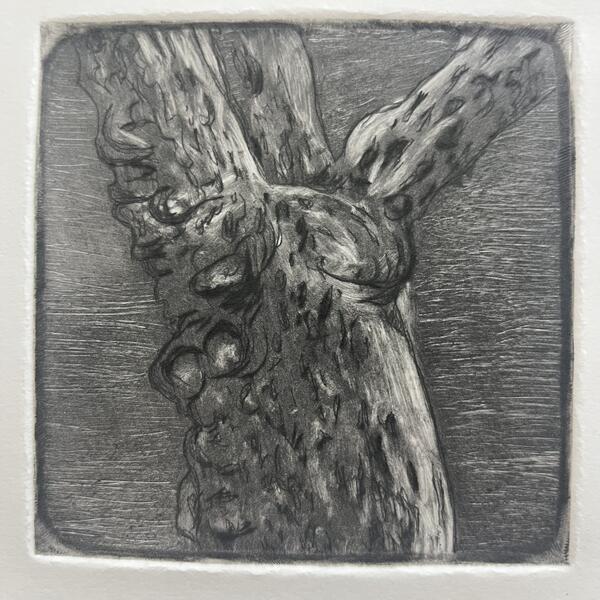 Platanus Occidentalis
Platanus Occidentalis -
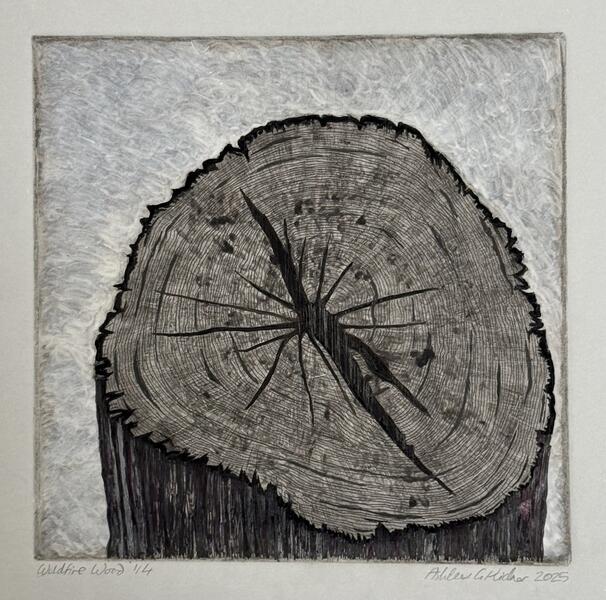 Wildfire wood
Wildfire wood -
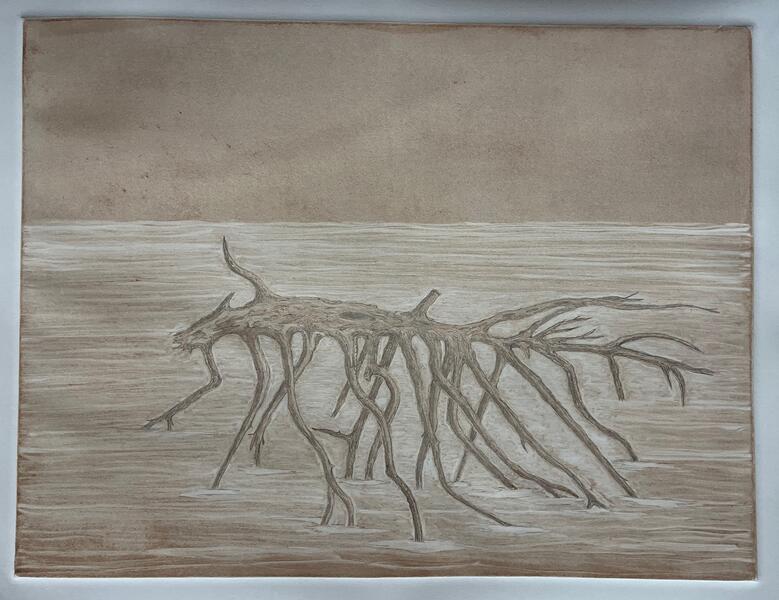 Hambleton Island Project
Hambleton Island ProjectMono print with pencil, 22" by 18", 2025. This work concerns the steady disappearance of Hambleton Island on the Eastern shore of MD due to sea level rise, sinking and coastal erosion. There was originally one Island almost a mile long, now there only remains 3 small Islands despite attempts in 1970 to preserve the whole Island.
-
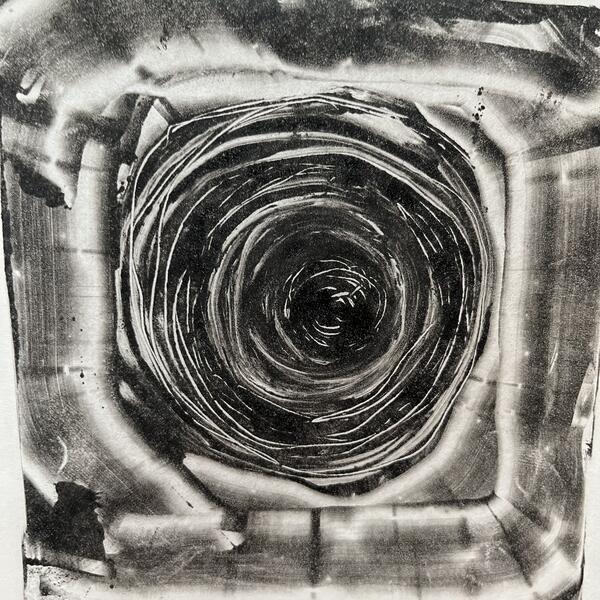 The root of Time
The root of Timemono print on paper, 10" by 12", 2022
-
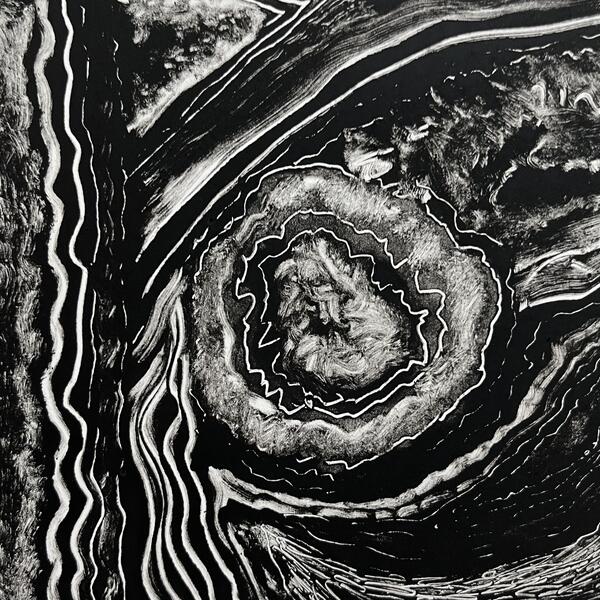 The vortex
The vortexMono print on paper, 12" by 10", 2022
-
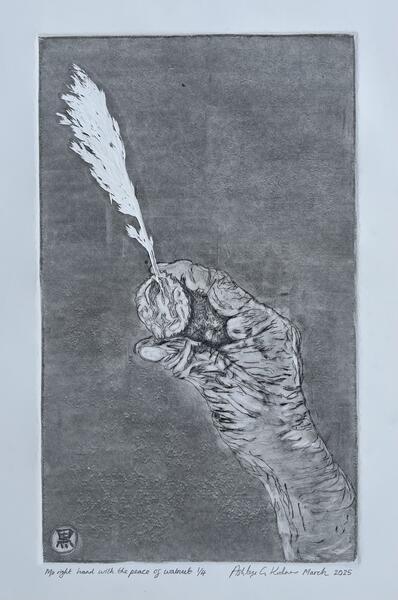 My righjt hand with the peace of walnut
My righjt hand with the peace of walnutDry point, feather, with pencil and ink 22"by 16" 2025
Preservation work with Chimney swifts and solitary Bees
This project highlights some of my work in helping preserve habitats for Chimney Swifts and Solitary Bees;
Baltimore has one of the biggest Chimney Swift migrations on the East Coast. Here in Hampden we had to fight tooth and nail to ensure the Book Bindery Building on Elm St. was designated Historic thus preserving it's 70ft chimney. This chimney serves as a nightly resting place for thousands of Chimney swifts during their spring and summer migration to South America.
My work with solitary bees has involved designing and installing numerous solitary bee houses in parks and private gardens in Baltimore along with installing Pollinator/wildlife gardens throughout Maryland that provide food and habitat for bees, butterflies, clearwing moths and other pollinators. In addition to habitat and food for birds.
-
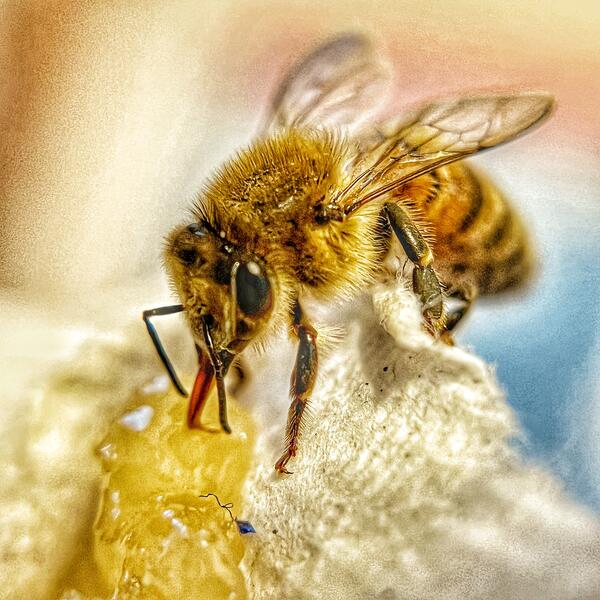 Portrait of a honey bee (Apis mellifera)
Portrait of a honey bee (Apis mellifera)This photo shows a honey bee that accidentally made it's way into my studio and was struggling. I fed it local honey and released it.
-
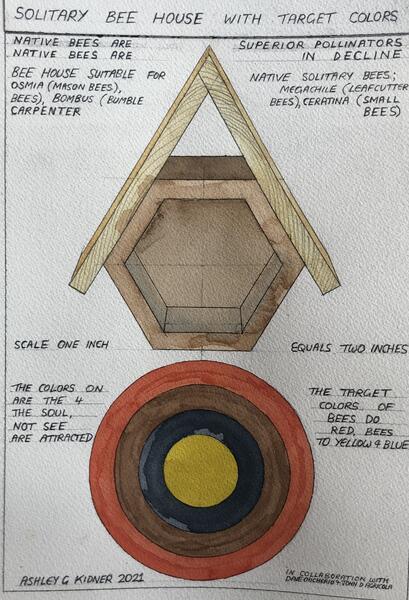 Sketch for solitary bee house
Sketch for solitary bee houseSketch for solitary bee house
-
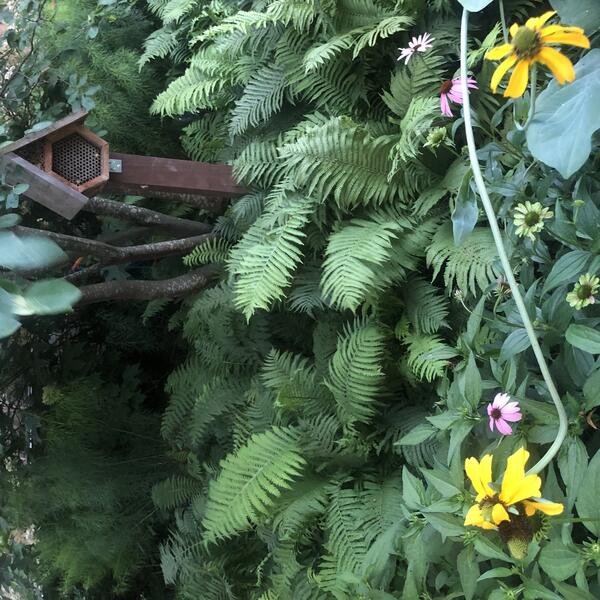 Solitary Bee House in Artist's garden
Solitary Bee House in Artist's garden -
Chaetura Pelagica (Chimney Swift) habitat destruction
Video of chimney swift installation in my studio, featuring the stoney run coffin.
-
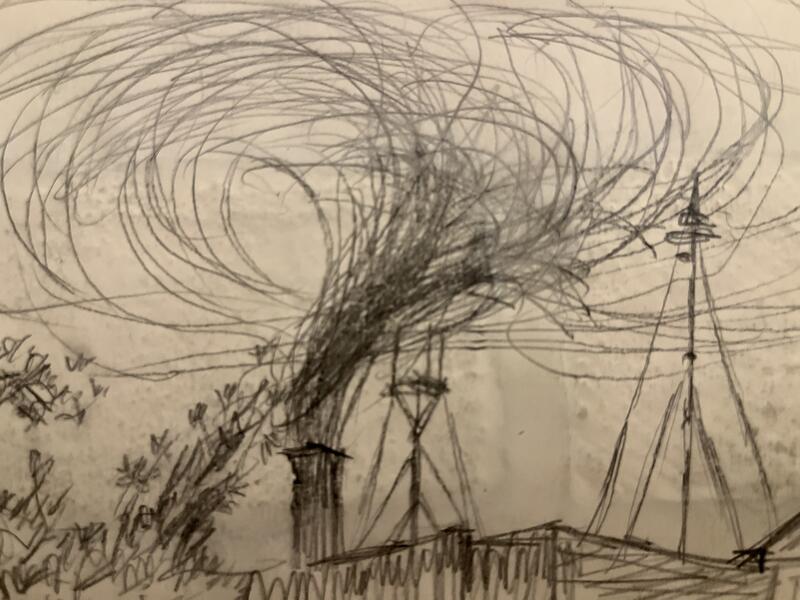 Sketch of Book Bindery building Chimney with Swift murmuration before evening descent, sept 2022
Sketch of Book Bindery building Chimney with Swift murmuration before evening descent, sept 2022 -
Megachile Species (leafcutter bees) cleaning 2022Leafcutter Bees cleaning right after hatching in springtime
-
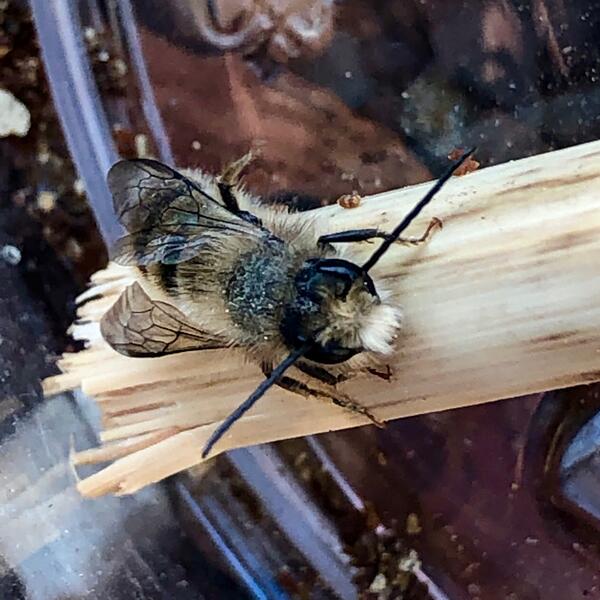 Megachile species (leaf cutter bee)This photo shows a leaf cutter bee soon after hatching, the eggs had been kept in my fridge during the winter! This photo was used in the bee house making workshop I gave at the Peale Center, Baltimore MD in 2018.
Megachile species (leaf cutter bee)This photo shows a leaf cutter bee soon after hatching, the eggs had been kept in my fridge during the winter! This photo was used in the bee house making workshop I gave at the Peale Center, Baltimore MD in 2018. -
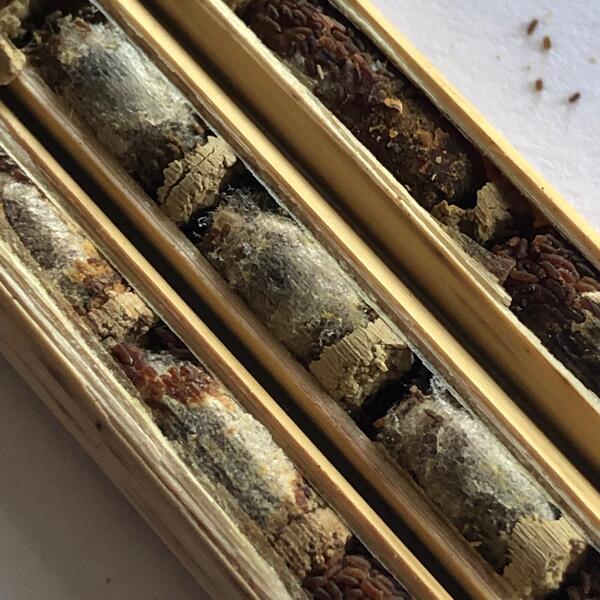 Leafcutter bee eggs in grass stems
Leafcutter bee eggs in grass stemsThis picture shows leaf cutter bee eggs in grass stems, the eggs are surrounded by pollen and are separated by mud packs. This was from another bee house constructed at the Art on the Farm workshop and installed in my garden.
-
 Chaetura Pelegica installation
Chaetura Pelegica installationInstallation at my studio about the chimney swifts and their autumn migration stop in Baltimore's book bindery chimney; Watercolor, brick and sand, 2022
-
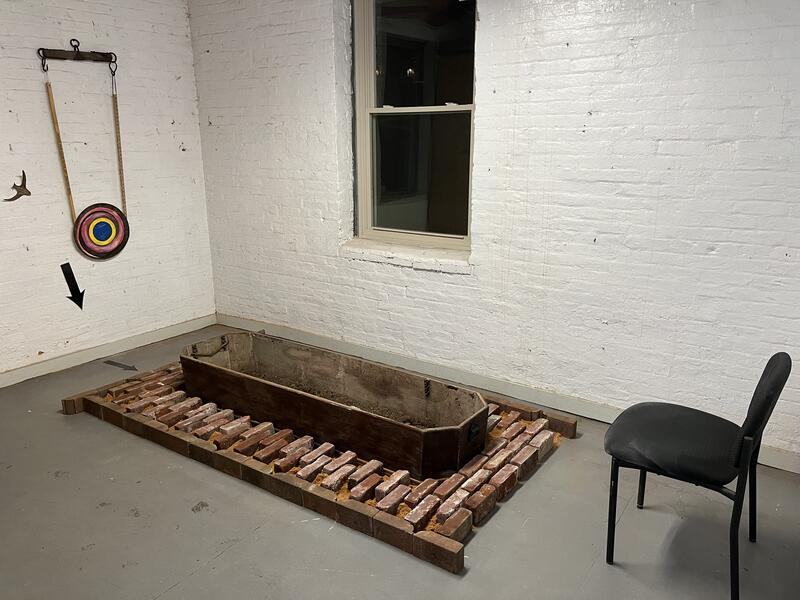 Chautura Pelegrina
Chautura PelegrinaInstallation at my studio about the chimney swifts and their autumn migration stop in Baltimore's book bindery chimney; Watercolor, brick and sand, 2022
Watercolors
The watercolors presented in this project are all recent ( 2019-2023) with some inspired by my interest in mutation. My recent work, as a response to the Covid 19 pandemic, has produced a series of works inspired by nature but often featuring strange twists or mutations. Some of these drawings and paintings were started after I had a medical procedure to insert a small tube in my body where a large aneurysm had developed.
-
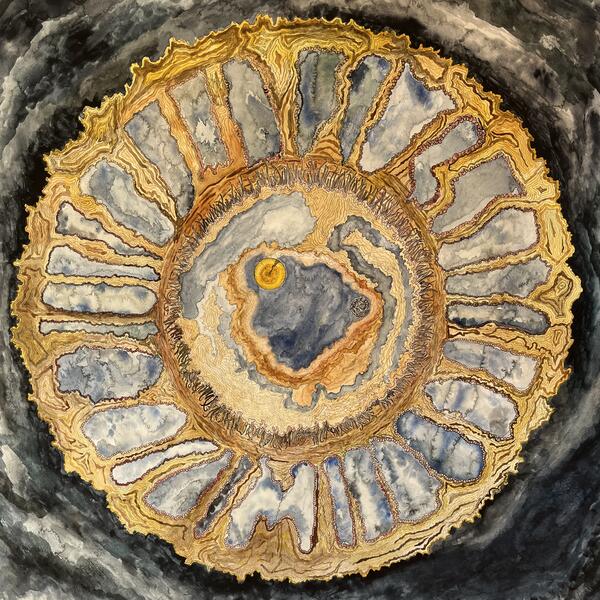 The expansion of the universe 2022THE EXPANSION OF THE UNIVERSE (2022); Pencil, Ink and watercolor on paper, 42"by 42" This work was inspired by the amazing photographs from the space telescope Hubble and most recently Webb.
The expansion of the universe 2022THE EXPANSION OF THE UNIVERSE (2022); Pencil, Ink and watercolor on paper, 42"by 42" This work was inspired by the amazing photographs from the space telescope Hubble and most recently Webb. -
Death of a Cactus
-
Angliacus anglicanna naturalis
Angliacus anglicanna naturalis, 2021 Iliacus anglicanna naturalis, 2021 Pencil, Ink and watercolor on paper (24" by 42")
-
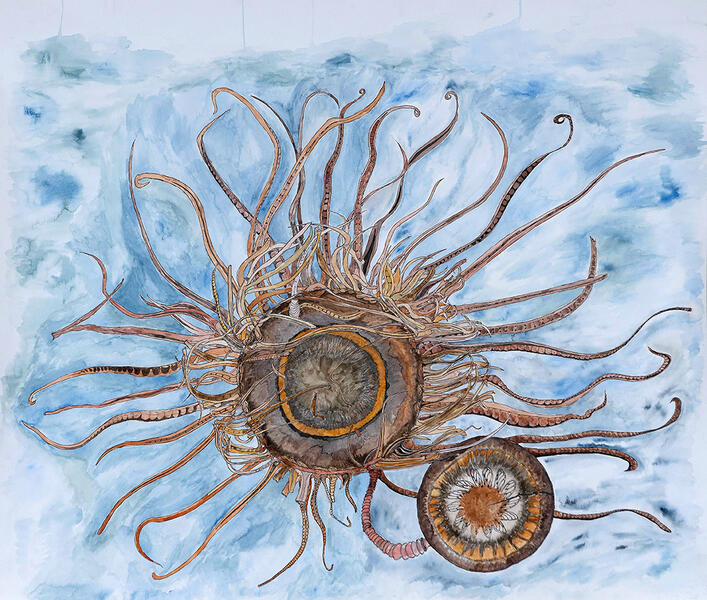 Oak seed Mutation, 2021Pencil, ink and watercolor on paper, 22" by 42".
Oak seed Mutation, 2021Pencil, ink and watercolor on paper, 22" by 42". -
Feather mutation (2022)Pencil, Ink and watercolor on paper (2021). 24" by 44"
-
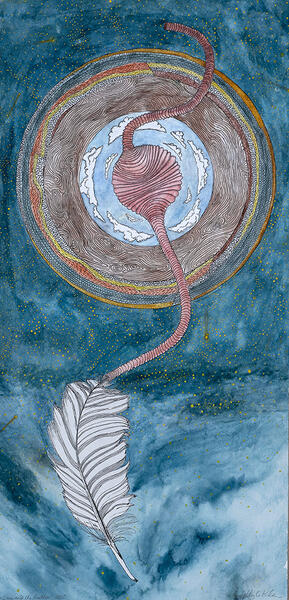 The Lung and Feather 2020Pencil, ink and watercolor. 36" by 18"
The Lung and Feather 2020Pencil, ink and watercolor. 36" by 18" -
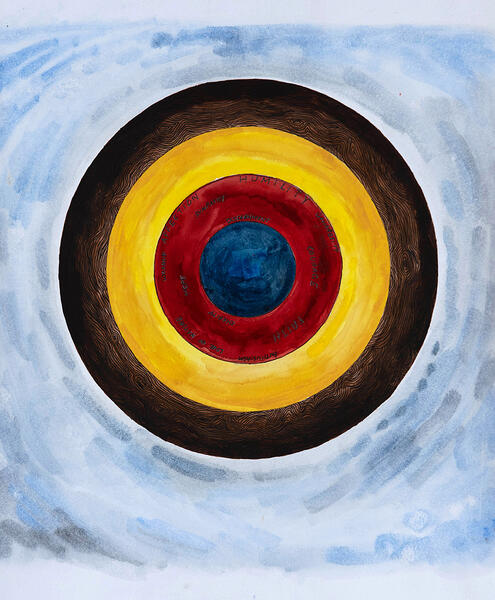 The colors of the soul (2019)This watercolor (18" by 18") is from a series I've been working on drawing influence from a book about the soul, which was acquired by the Dutch art collector George Loudon. The book was on display at an exhibition at the Whitechapel Gallery, London in 2019 but viewers only able to read 1 page. At the time I was awaiting an operation to remove a large aneurysm in my left iliac and became fascinated with the notes in the book describing different soul colors, there supposedly being only red, blue, yellow and brown.
The colors of the soul (2019)This watercolor (18" by 18") is from a series I've been working on drawing influence from a book about the soul, which was acquired by the Dutch art collector George Loudon. The book was on display at an exhibition at the Whitechapel Gallery, London in 2019 but viewers only able to read 1 page. At the time I was awaiting an operation to remove a large aneurysm in my left iliac and became fascinated with the notes in the book describing different soul colors, there supposedly being only red, blue, yellow and brown. -
 Acorn mutation (2021)Acorn Mutation (2021) Watercolor, pencil and ink on paper 24" by24"
Acorn mutation (2021)Acorn Mutation (2021) Watercolor, pencil and ink on paper 24" by24" -
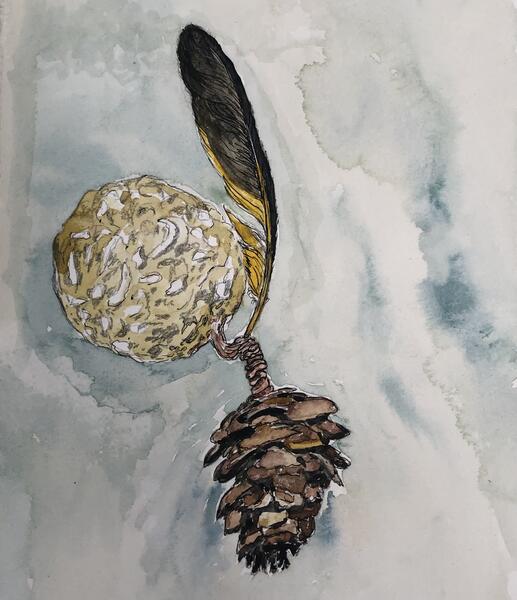 Praying feather
Praying featherWatercolor on paper, 10" by 8", 2022
-
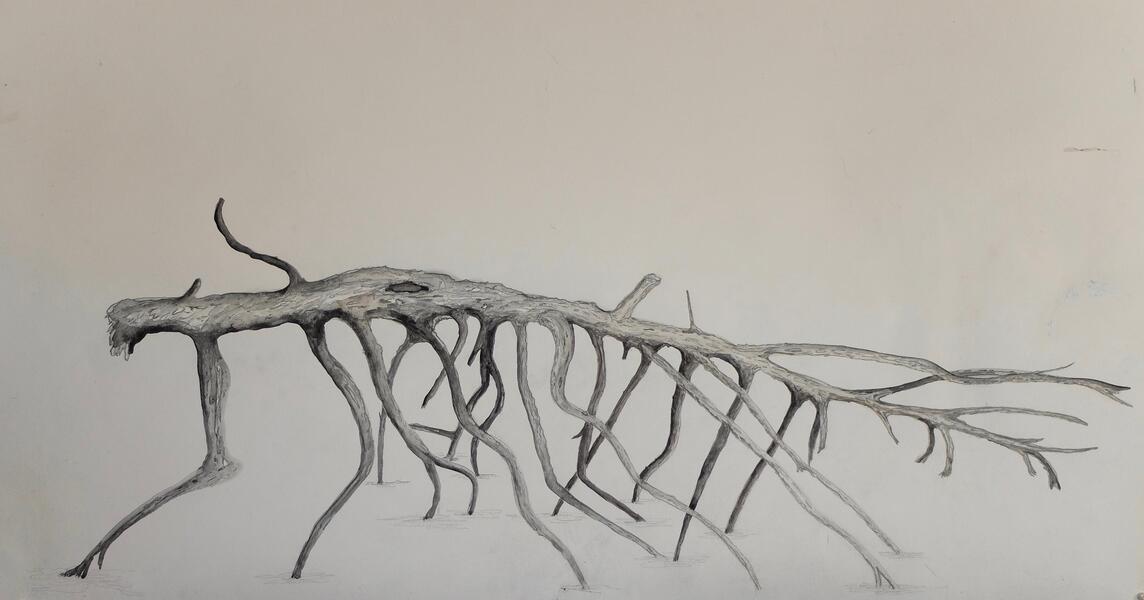 Hambleton Island Project
Hambleton Island ProjectPencil, watercolor on paper, 20" by 30"
Nature Art in the Park (Leakin Park), Art on the Trail (Lake Roland Park) and other installations installed in US
These works are part of the Art on the Trail series of installations at Lake Roland Park, Baltimore and Nature Art in the Park work in Leakin Park, Baltimore (2014 to Present). They include my Pollinator Hexagon series of installations. In addition to other work installed in the US.
https://chesapeakebaymagazine.com/art-on-the-waterfront-brings-inspired-outdoor-art-to-south-baltimore/
-
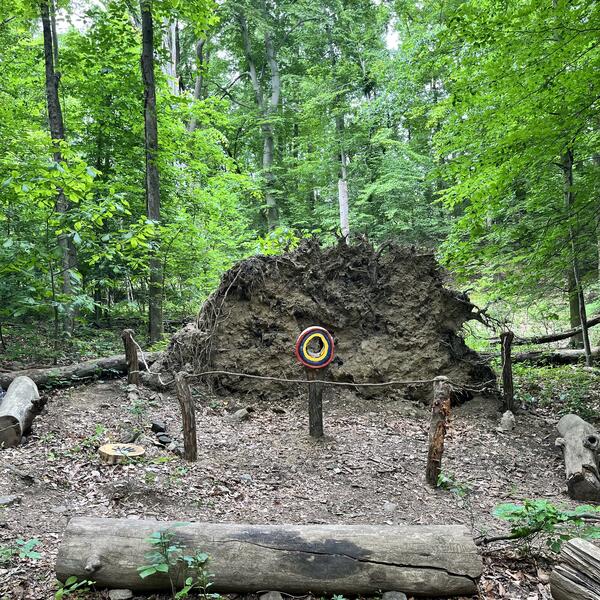 Monument to a Fallen Oak
Monument to a Fallen OakMonument to a Fallen Oak, 2023, mixed media installation, (130ft by 35ft by 8ft) for Nature Art in the Park 2023
-
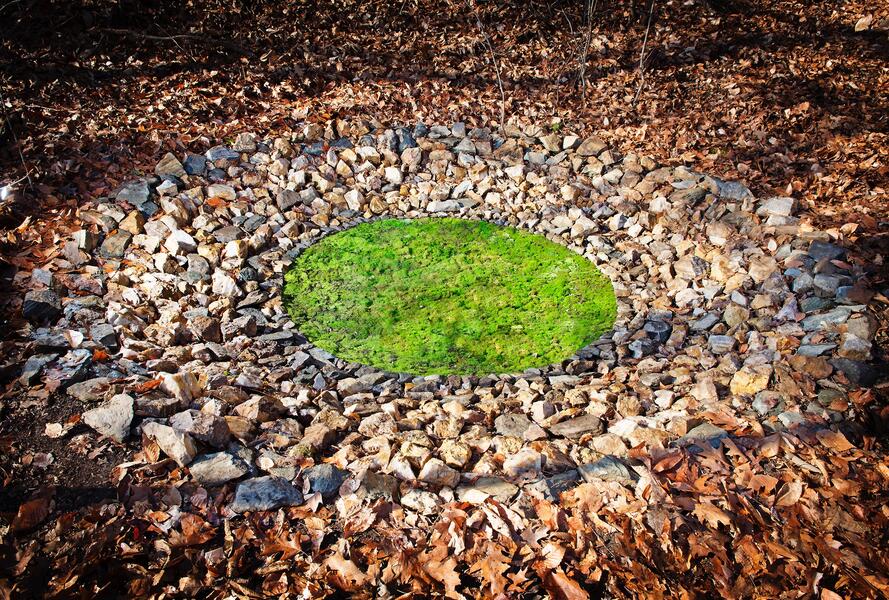 Earth Transfer(second phase) Anti-cline (2015)Earth transfer installed at Lake Roland moss and stone 12ft diameter
Earth Transfer(second phase) Anti-cline (2015)Earth transfer installed at Lake Roland moss and stone 12ft diameter -
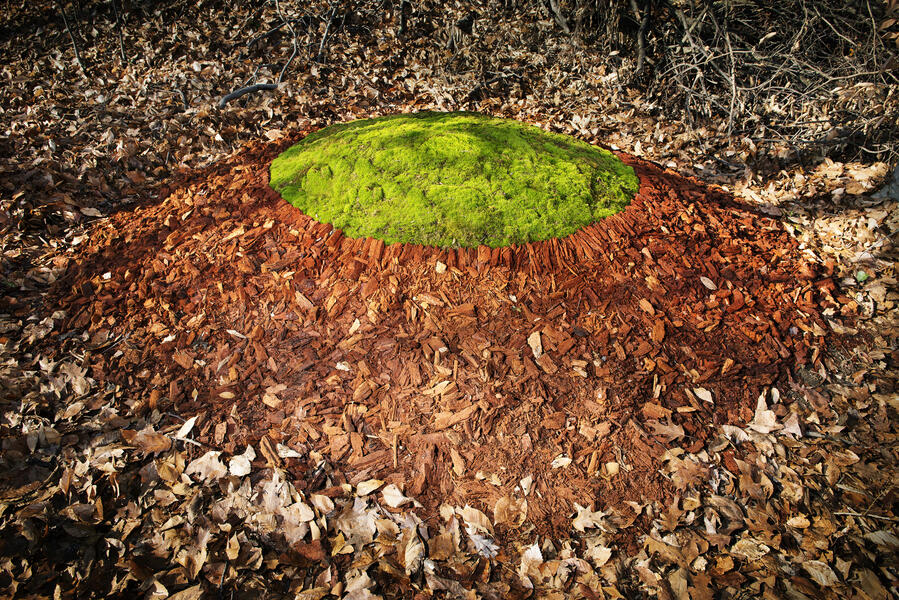 Earth transfer with stone, wood and mossInstalled at Lake Roland for Art on the Trail exhibit Northern mound or barrow; Fall phase; 12ft diameter moss circle surrounded by rotting cedar mulch found nearby. Photo by greg Dohler
Earth transfer with stone, wood and mossInstalled at Lake Roland for Art on the Trail exhibit Northern mound or barrow; Fall phase; 12ft diameter moss circle surrounded by rotting cedar mulch found nearby. Photo by greg Dohler -
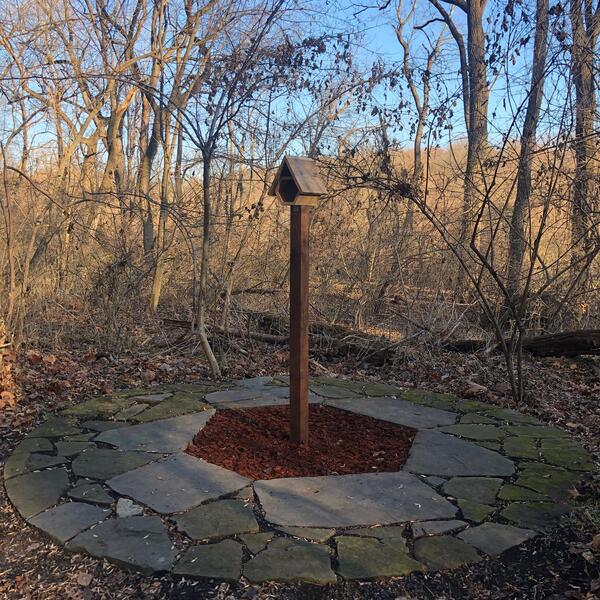 Pollinator hexagon I with solitary bee house (2019)My pollinator hexagon I installation has the addition of a solitary bee house above replanted pycanthemum viginianum (mountain mint).
Pollinator hexagon I with solitary bee house (2019)My pollinator hexagon I installation has the addition of a solitary bee house above replanted pycanthemum viginianum (mountain mint). -
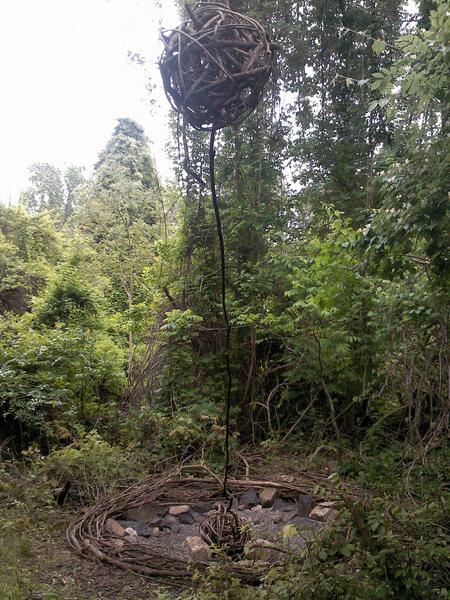 Well of Passion, 2014Well of Passion, Nature Art in the Park 2014. Vine balls constructed from wisteria vines, gravel and boulders.
Well of Passion, 2014Well of Passion, Nature Art in the Park 2014. Vine balls constructed from wisteria vines, gravel and boulders. -
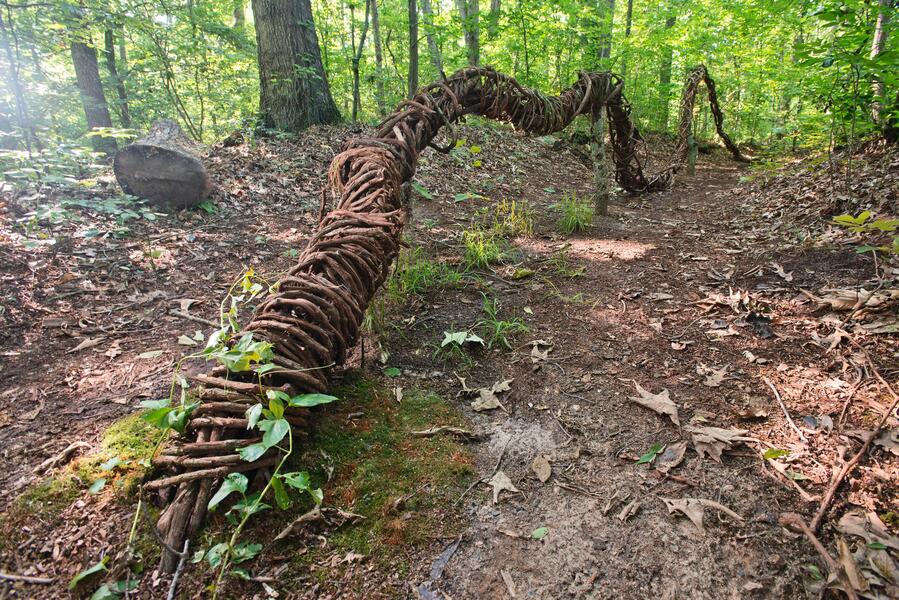 Swalevine 2016, Adkins Arboretum,MDThis installation was part of the "Artists in dialogue with nature" outdoor invitational at Adkins Arboretum, installed in late spring/early summer 2016. The installation was constructed using mainly non-native grape vines cut from the surrounding forest. The vines were twisted together to form a long (approx 85'), snaking sculpture which followed the course of a swale which may have been a road at some point in time. In the construction of the installation, dead branches were blown off and dropped into the swale, these branches were dug into the ground and used to support the heavy mass of vines. The sculpture was deemed finished when the vines became too heavy to manipulate. The native vine passionflower (passiflora incarnata), was planted at the beginning of the swalevine. The installation brings up the subject of native and non-native species and their battle for dominance in the american ecosystem.
Swalevine 2016, Adkins Arboretum,MDThis installation was part of the "Artists in dialogue with nature" outdoor invitational at Adkins Arboretum, installed in late spring/early summer 2016. The installation was constructed using mainly non-native grape vines cut from the surrounding forest. The vines were twisted together to form a long (approx 85'), snaking sculpture which followed the course of a swale which may have been a road at some point in time. In the construction of the installation, dead branches were blown off and dropped into the swale, these branches were dug into the ground and used to support the heavy mass of vines. The sculpture was deemed finished when the vines became too heavy to manipulate. The native vine passionflower (passiflora incarnata), was planted at the beginning of the swalevine. The installation brings up the subject of native and non-native species and their battle for dominance in the american ecosystem. -
Pollinator Hexagon IVPollinator Hexagon IV (2018); Installed for the Art on the Waterfront show in Middle branch Park. The stone was delaware river gravel. Central zone; Rudbeckia maxima (giant coneflower) Middle zones; Echinacea purpurea "magnus" (purple coneflower) Outer zones Asclepias tuberosa (butterfly weed)
-
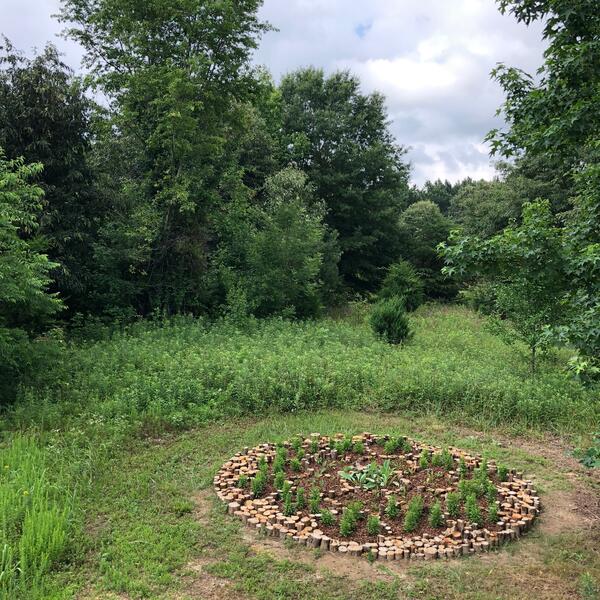 Pollinator Hexagon VPollinator Hexagon V (2018); Installed for the Artists in Dialogue with Nature show at Adkins Arboretum, Ridgely MD. The dead wood was collected from around the Arboretum and was a mixture of loblolly pine, red maple and other native trees. Central zone; Rudbeckia maxima (giant cone flower), Middle zones Echinacea purpurea "rubinstern" (purple coneflower) outer zones; Solidago hybrida "little lemon" (Little lomon goldenrod)
Pollinator Hexagon VPollinator Hexagon V (2018); Installed for the Artists in Dialogue with Nature show at Adkins Arboretum, Ridgely MD. The dead wood was collected from around the Arboretum and was a mixture of loblolly pine, red maple and other native trees. Central zone; Rudbeckia maxima (giant cone flower), Middle zones Echinacea purpurea "rubinstern" (purple coneflower) outer zones; Solidago hybrida "little lemon" (Little lomon goldenrod) -
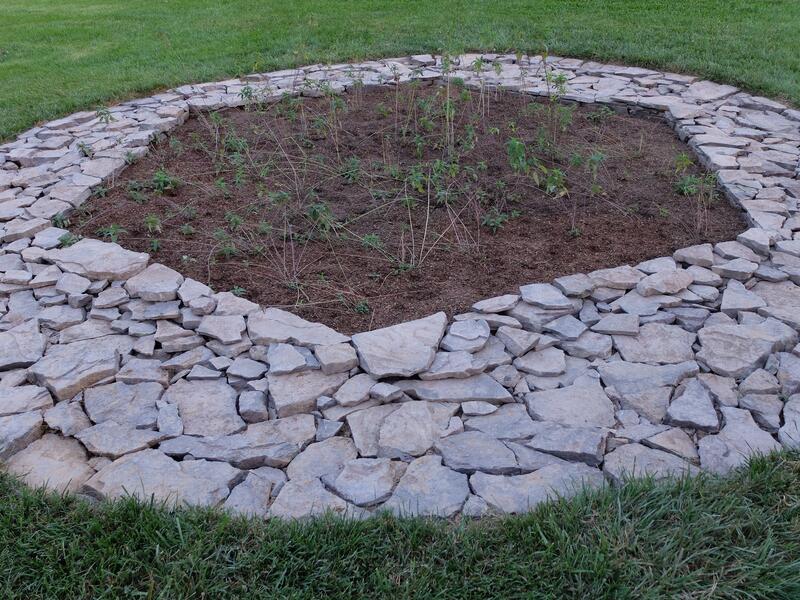 Pollinator Hexagon IIThis installation was part of the 2017 Inside/Out sculpture show at Montpellier Arts center in Laurel, MD. The stone used was colonial wallstone and the perennials were Monarda fistulosa (wild bergamont)
Pollinator Hexagon IIThis installation was part of the 2017 Inside/Out sculpture show at Montpellier Arts center in Laurel, MD. The stone used was colonial wallstone and the perennials were Monarda fistulosa (wild bergamont) -
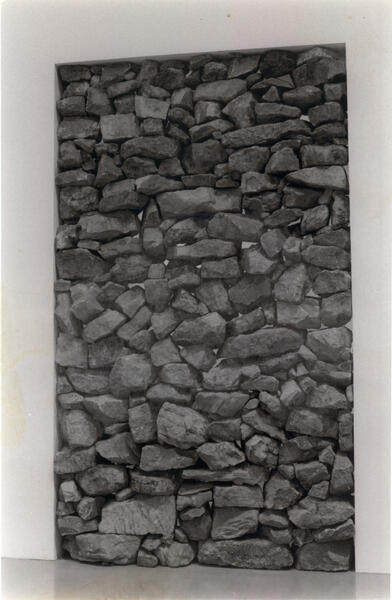 Jannis Kounellis stone wall 2002This wall was installed as part of the 2002 Arte Povera show in the Hirshhorn museum in DC. We followed the instructions of the artist to create a free standing dry laid wall that was visible from both sides using local stone, in this case western MD fieldstone.
Jannis Kounellis stone wall 2002This wall was installed as part of the 2002 Arte Povera show in the Hirshhorn museum in DC. We followed the instructions of the artist to create a free standing dry laid wall that was visible from both sides using local stone, in this case western MD fieldstone.
Earth Works installed in Reykjavik, Iceland and the UK
Blakeney Point Flint Project #5 was the culmination of 4 previous installations (or sketches) in exactly the same location on Blakeney Point in Norfolk, UK. The installation was a homage to the Neolithic stone circles found throughout the British Iles.
2009 Basaltic Hexagon project; Basalt stones were collected and placed in a hexagonal pattern, each hexagon approx. 3ft in width. The pattern reflects the nature of basalt when emerging from the earth, it often forms large hexagonal layers. The installation was started at low tide, I then worked until high tide started to lap on to the completed hexagons.
2014 The worship of Basalt I and II; Location directly at the end of runway for Reykjavik airport. A large basalt boulder (approx. 3ft long) lying secluded from the surrounding rocks was selected for the installation. Small basalt stones with kelp attached were selected then dragged across the sand and placed with the stones facing the boulder. The action of dragging the stones across the sand (which had a light dusting of snow on it) left interesting lines on the beach. The installation was performed 2 times on consecutive days (high tide washing away the stones overnight); in part 1 a hexagon was formed around the boulder, in part 2 the shape was an outline of the boulder.
-
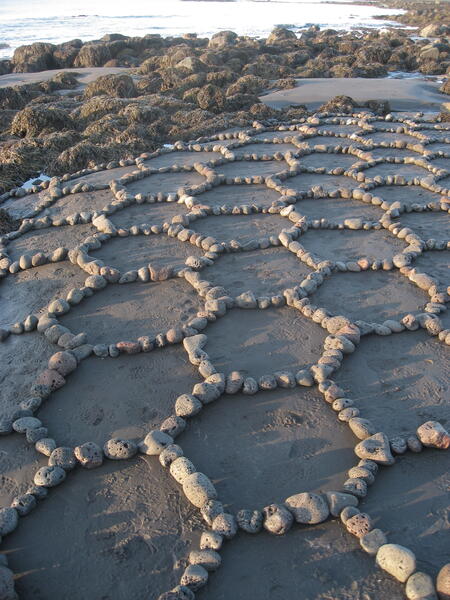 Basaltic Hexagon project 2009Basalt stones arranged in hexagonal form at low tide, late afternoon.
Basaltic Hexagon project 2009Basalt stones arranged in hexagonal form at low tide, late afternoon. -
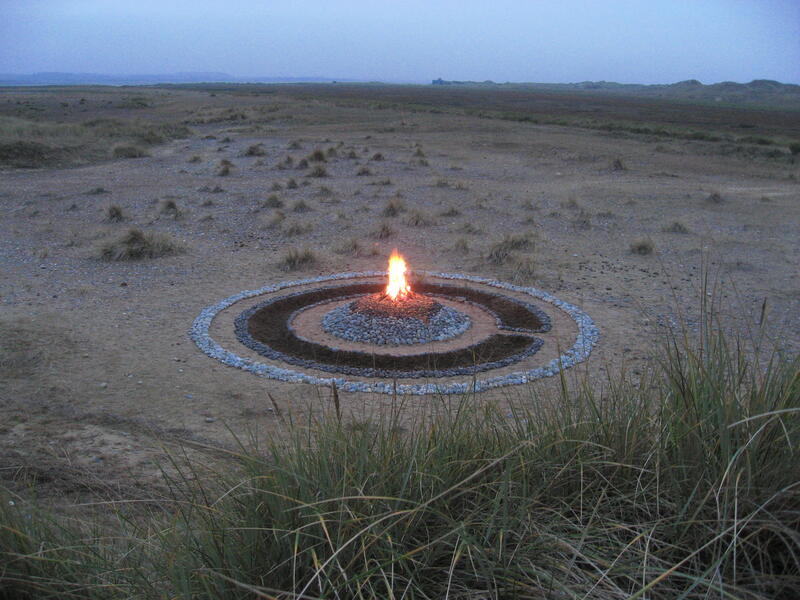 Blakeney Point Flint Project #5 2007Photograph taken from the dunes just above the installation.Cairn, henge and stonework completed, fire lit and burning in the late afternoon.
Blakeney Point Flint Project #5 2007Photograph taken from the dunes just above the installation.Cairn, henge and stonework completed, fire lit and burning in the late afternoon. -
Blakeney point flint project #5 2007
This photograph shows a close up of the installation after the central fire had burned.
-
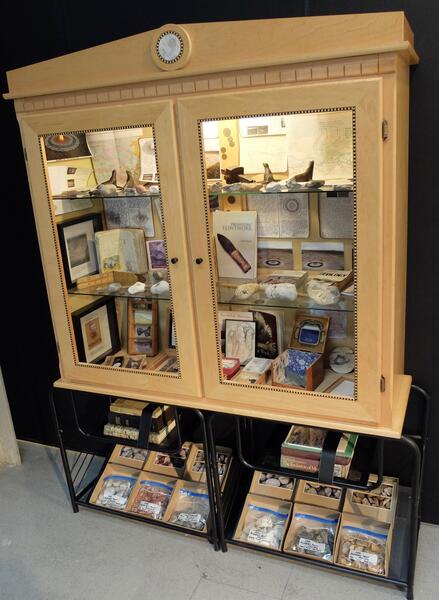 Blakeney Point Flint project cabinet installed for Artscape 2017 Fieldwork Exhibtion.
Blakeney Point Flint project cabinet installed for Artscape 2017 Fieldwork Exhibtion.This cabinet installation was exhibited as part of the Fieldwork exhibition for Artscape 2017. It contained photographs, sketches, samples of flint, box constructions and reference books all related to the Blakeney Point flint projects installed in Norfolk, England between 2003-2008.
-
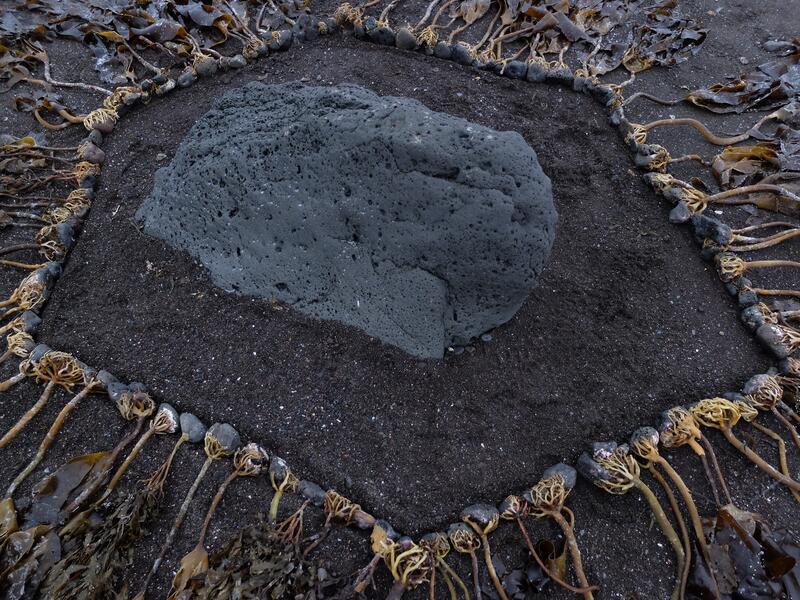 The worship of Basalt (pt. 1)THE WORSHIP OF BASALT (Pt. 1) 2014 Installed on the Beach near Reykjavik airport, Reykjavik, Iceland. Basalt boulder surrounded by small basalt stones with kelp attached. The hexagonal shape reflects the form basalt takes when deposited in large layers on the sea floor.
The worship of Basalt (pt. 1)THE WORSHIP OF BASALT (Pt. 1) 2014 Installed on the Beach near Reykjavik airport, Reykjavik, Iceland. Basalt boulder surrounded by small basalt stones with kelp attached. The hexagonal shape reflects the form basalt takes when deposited in large layers on the sea floor. -
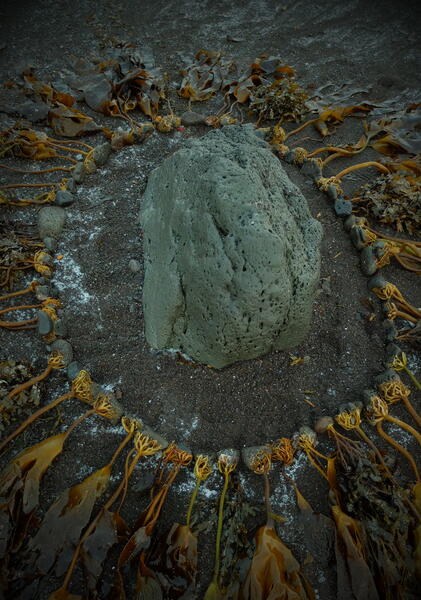 The worship of Basalt part 2The small basalt pebbles encircle and pay homage to the boulder
The worship of Basalt part 2The small basalt pebbles encircle and pay homage to the boulder -
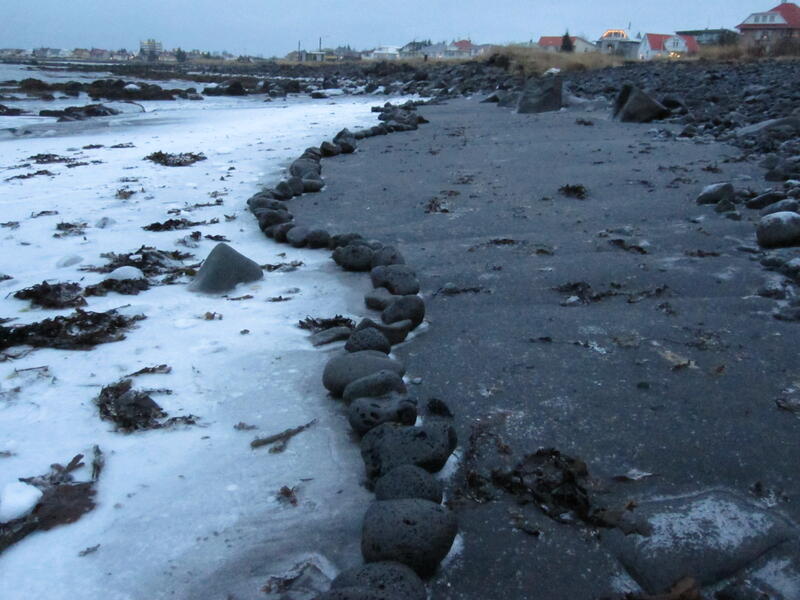 Basalt High Tide Marker 2010In this installation I walked along the beach at low tide and tried to guess at the location where high tide would come up to on the beach. Basalt stones were collected and placed to mark the positions. On return the next day I found my guesses to be correct, the atlantic ocean side of the stones were frozen while the landward side remained unfrozen. The effect was as if the stones had stopped the high tide at this point.
Basalt High Tide Marker 2010In this installation I walked along the beach at low tide and tried to guess at the location where high tide would come up to on the beach. Basalt stones were collected and placed to mark the positions. On return the next day I found my guesses to be correct, the atlantic ocean side of the stones were frozen while the landward side remained unfrozen. The effect was as if the stones had stopped the high tide at this point. -
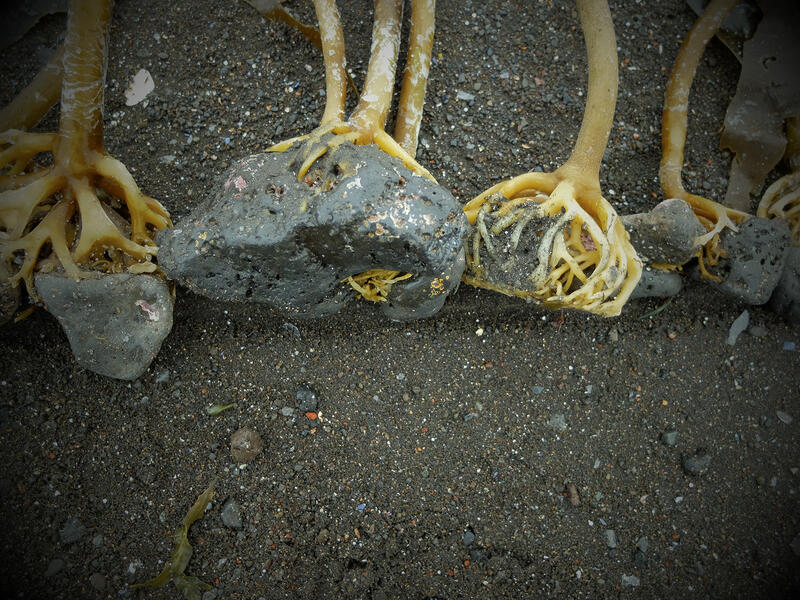 The worship of BasaltSmall basalt stones with kelp attached. The roots from the kelp were able to penetrate the porous basalt stones.
The worship of BasaltSmall basalt stones with kelp attached. The roots from the kelp were able to penetrate the porous basalt stones. -
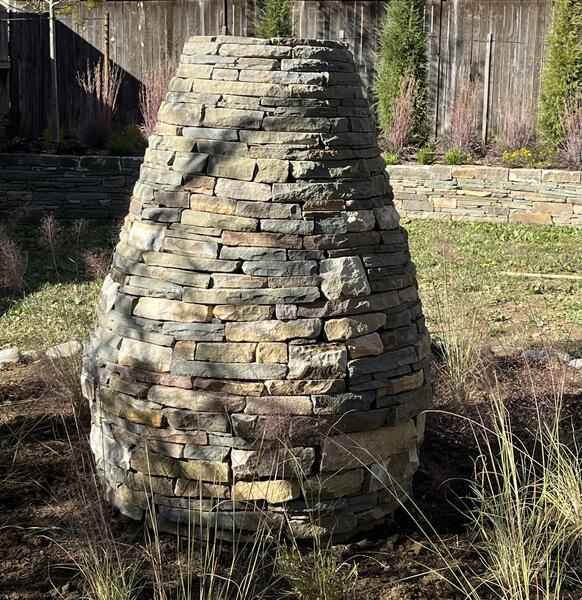 Stone Cairn (2022)This stone cairn (5ft tall max diameter 22") was built with a mix of stone, constructed dry laid (no mortar). It will be eventually converted into a bee friendly water feature.
Stone Cairn (2022)This stone cairn (5ft tall max diameter 22") was built with a mix of stone, constructed dry laid (no mortar). It will be eventually converted into a bee friendly water feature. -
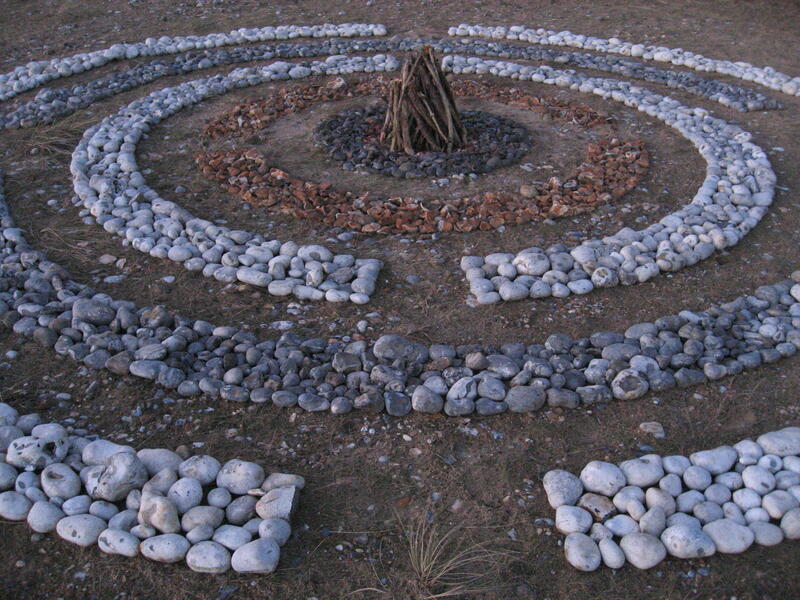 Blakeney Point flint project #4 2007Photo looking along north/south axis of installation.
Blakeney Point flint project #4 2007Photo looking along north/south axis of installation.
Hampden elementary and middle school (HEMS) outdoor classroom and Druid Heights Nature Playspace
The Druid Heights Nature Playspace project involved transforming 2 empty lots on McCulloh St in the Druid Heights area into a community nature playspace with an emphasis on sustainability and native pollinator plants. The design was drawn up by myself with help and advice from The Druid Heights Development Corporation, National Wildlife Federation, The Univesity of MD Medical Center and the US Fish and Wildlife Service. The installation was completed by my company International Landscaping and Design over a period of approximately 8 months in 2019.
https://blog.nwf.org/2019/08/bringing-nature-play-to-west-baltimore/?_ga=2.243302278.2098123358.1576712363-1506711329.1576529155
-
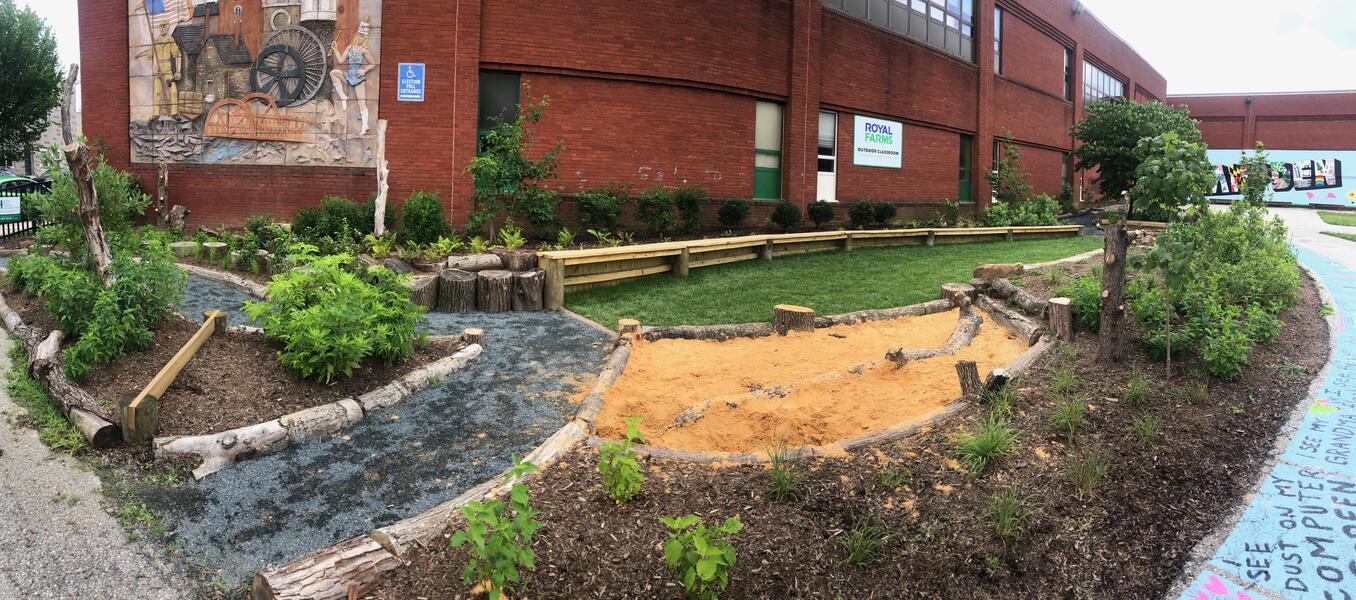 Hems Outdoor classroom and educational play space 2021
Hems Outdoor classroom and educational play space 2021 -
HEMS outdoor class room and play space, 2021The HEMS project involved designing and installing an outdoor classroom and educational playspace featuring a native pollinator and wildlife garden, installed by my company International Landscaping and Design.
-
HEMS outdoor classroom and play space, 2021The HEMS project involved designing and installing an outdoor classroom and educational playspace featuring a native pollinator and wildlife garden, installed by my company International Landscaping and Design.
-
Rep. Elijah Cummings Nature playspace dedication in BaltimoreThis video has a small clip of the late great Elijah Cummings dedicating the playspace in august of 2019
-
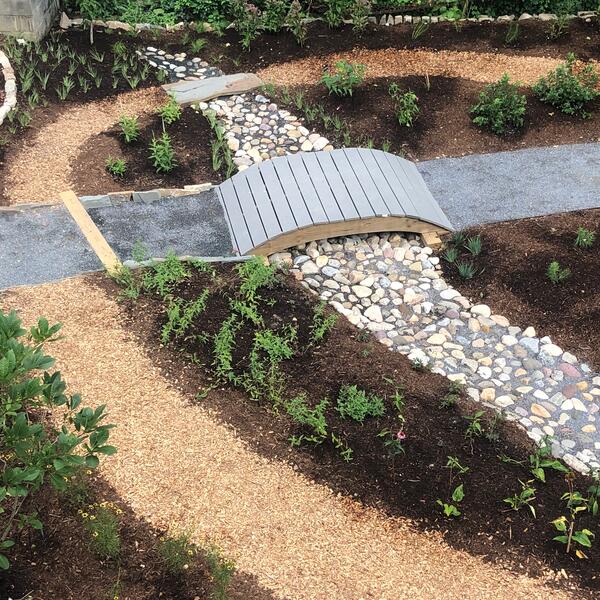 Bridge over dry stream bedOverhead view of the Playspace showing a bridge over the dry stream bed which leads to the rain garden.
Bridge over dry stream bedOverhead view of the Playspace showing a bridge over the dry stream bed which leads to the rain garden. -
 Solitary bee house at center of labyrinthThis bee house will provide a nesting site for native bees, most likely mason and leafcutter bees.
Solitary bee house at center of labyrinthThis bee house will provide a nesting site for native bees, most likely mason and leafcutter bees. -
 Playspace view from McCulloh St. (east)View showing playspace features such as hopscotch, sandpit with log jumps and the winding path with bridge in the background.
Playspace view from McCulloh St. (east)View showing playspace features such as hopscotch, sandpit with log jumps and the winding path with bridge in the background. -
 View of rain garden from the west side of the playspaceThis view shows the rain garden which captures nearly all of the water that falls on the site. The plants in the foreground are rudbeckia fulgida (coneflower).
View of rain garden from the west side of the playspaceThis view shows the rain garden which captures nearly all of the water that falls on the site. The plants in the foreground are rudbeckia fulgida (coneflower). -
 This view shows the steps and tee pee grow art structureThe tee pee grow art structure is made from bamboo canes with native vines growing up, one of the cypress benches is also visible.
This view shows the steps and tee pee grow art structureThe tee pee grow art structure is made from bamboo canes with native vines growing up, one of the cypress benches is also visible.
Mail Art
These are a selection of mail art cards (mainly pencil and watercolor) that in some cases have travelled great distances. I sometimes used mail art as a form of protest, as dealing with a physical card is more work than dealing with emails and I believe more effective. I have always been facinated with mail art and have been sending small sketches and drawings to friends and fellow artists throughout the years. Sometimes the postal stamps add an official feel to the artwork (as in the case of mailing cards from the Postal Museum in DC), thus changing the piece dramatically.
-
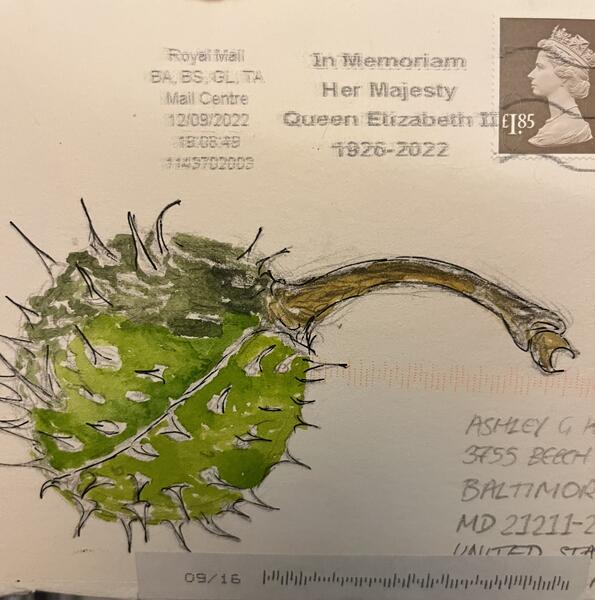 RIP Queen Elizabeth II
RIP Queen Elizabeth IIWatercolor sent form UK to USA the day after Queen Elizabeth's death.
-
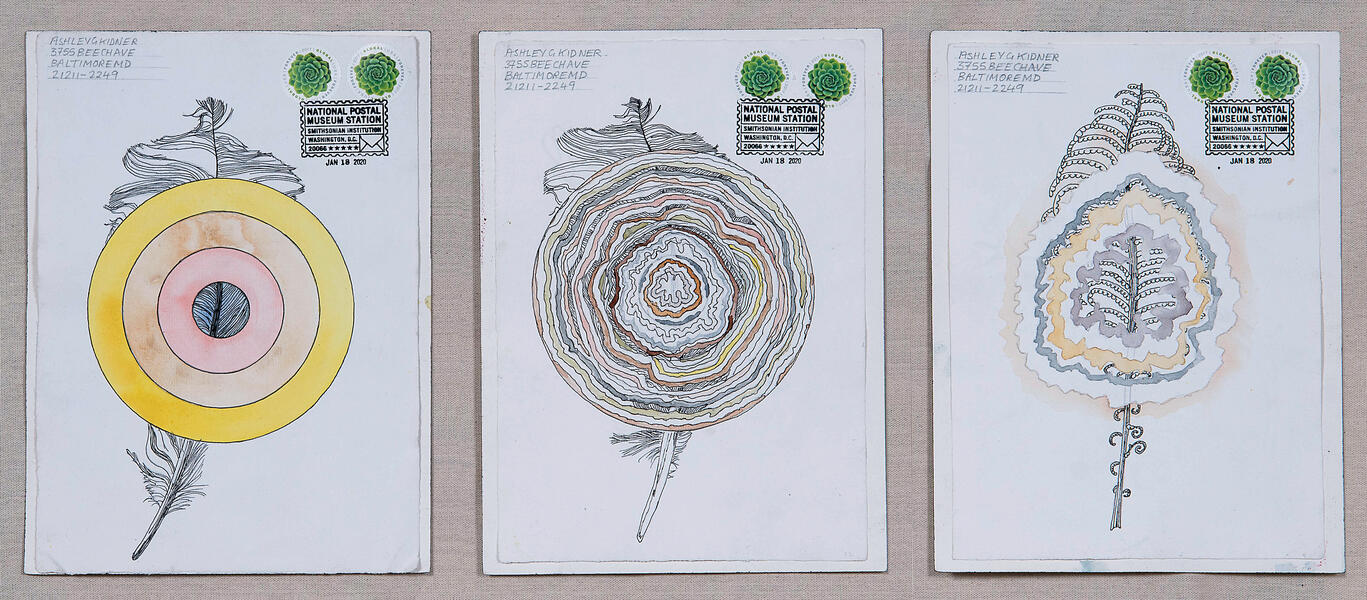 Feather mutation Triptych (2020)Feather mutation mailart triptych (2020) Watercolor, pencil, Ink on paper 12" by 40"
Feather mutation Triptych (2020)Feather mutation mailart triptych (2020) Watercolor, pencil, Ink on paper 12" by 40" -
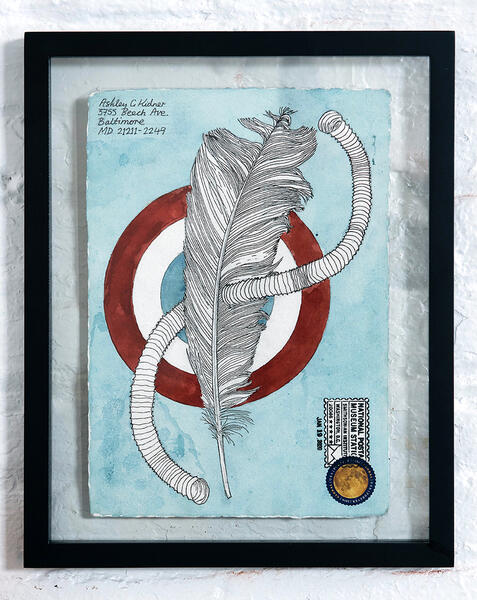 Mutated feather target (2020)Pencil,ink and watercolor (10" by 13")
Mutated feather target (2020)Pencil,ink and watercolor (10" by 13") -
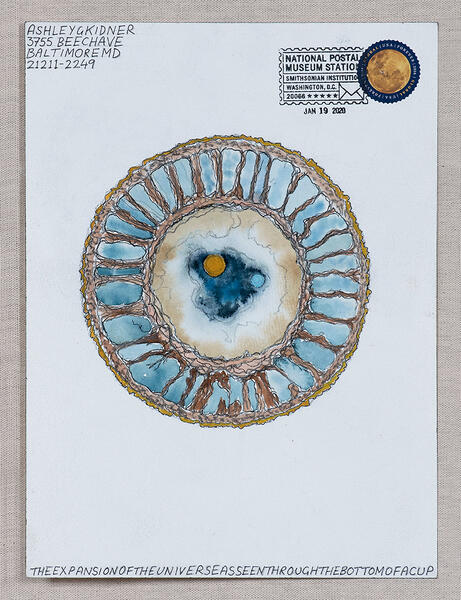 The expansion of the universe as seen through the bottom of a cup (2020)Pencil, ink and watercolor on paper (10" by 14")
The expansion of the universe as seen through the bottom of a cup (2020)Pencil, ink and watercolor on paper (10" by 14") -
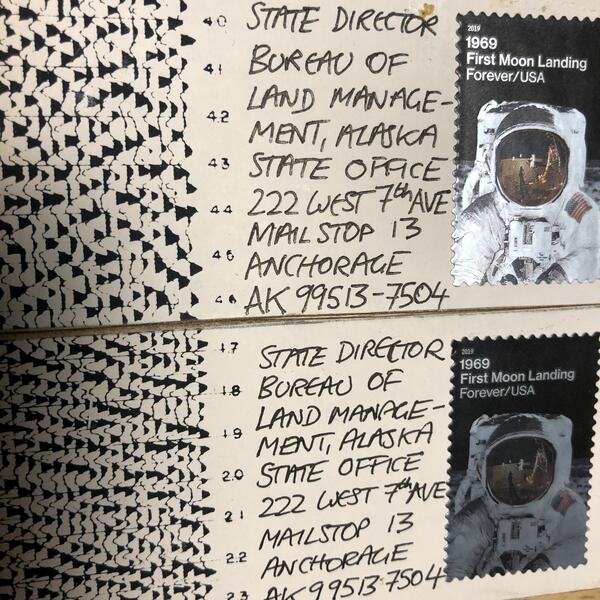 Arctic Refuge Drilling protest postcards (2020)Arctic Refuge Drilling protest postcards (2020) Seismic survey paper, pencil and ink. Mail art, 12 postcards mailed to Bureau of Land management in protest of Arctic refuge oil drilling. The permits have been put on hold for now.
Arctic Refuge Drilling protest postcards (2020)Arctic Refuge Drilling protest postcards (2020) Seismic survey paper, pencil and ink. Mail art, 12 postcards mailed to Bureau of Land management in protest of Arctic refuge oil drilling. The permits have been put on hold for now. -
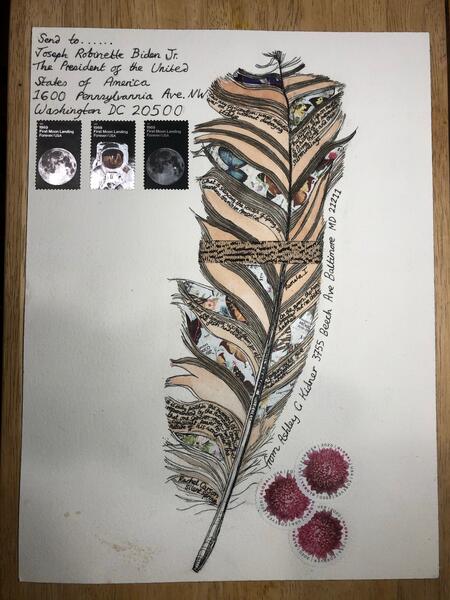 Postcard to President Biden, 2021Collage, watercolor, pencil and ink, 10" by 14" on paper. Mail art to President Biden discussing environmental issues. I did get reply! (a form letter)
Postcard to President Biden, 2021Collage, watercolor, pencil and ink, 10" by 14" on paper. Mail art to President Biden discussing environmental issues. I did get reply! (a form letter) -
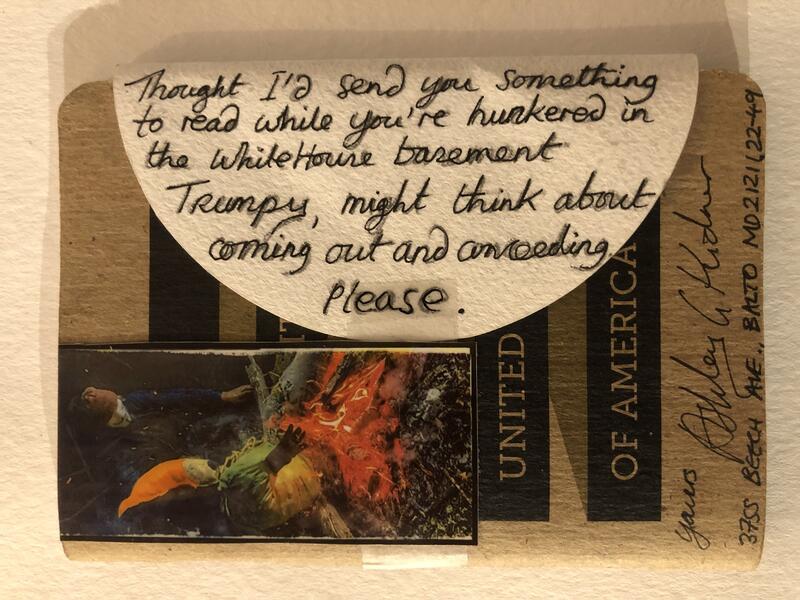 Protest card to Trump (2021)Mail art protest; A copy of the constitution sent to Trumpy after his refusal to concede the election.
Protest card to Trump (2021)Mail art protest; A copy of the constitution sent to Trumpy after his refusal to concede the election. -
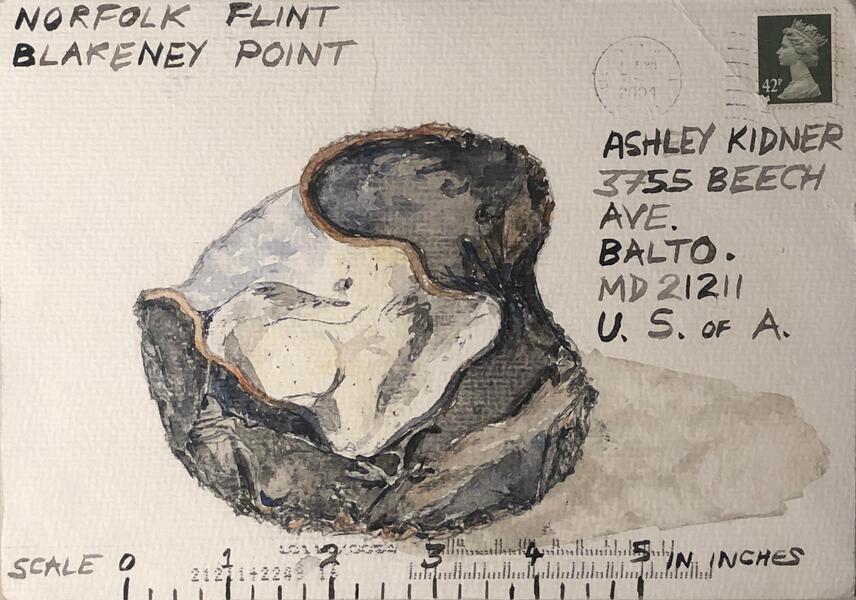 water color mail art sent from Norfolk (UK) to Baltimore (USA) (2002)
water color mail art sent from Norfolk (UK) to Baltimore (USA) (2002) -
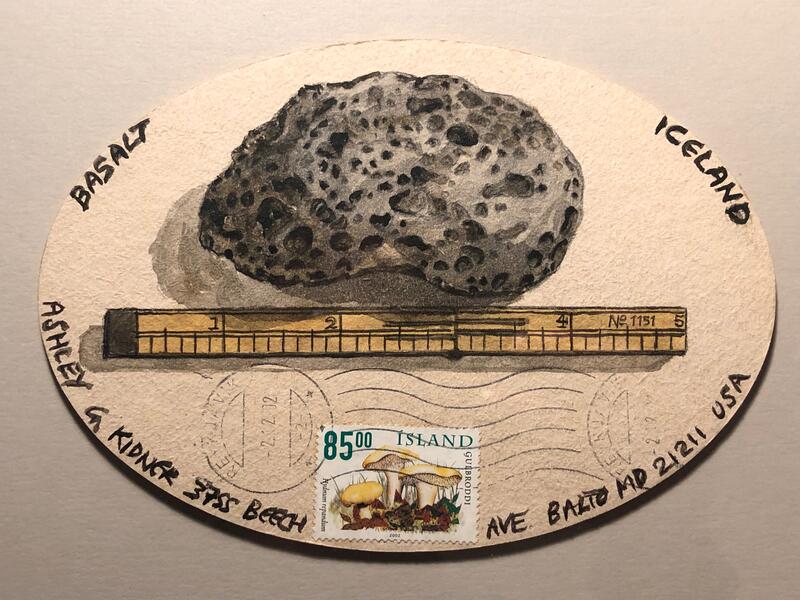 Water color mail art sent from Iceland to the US (2001)
Water color mail art sent from Iceland to the US (2001) -
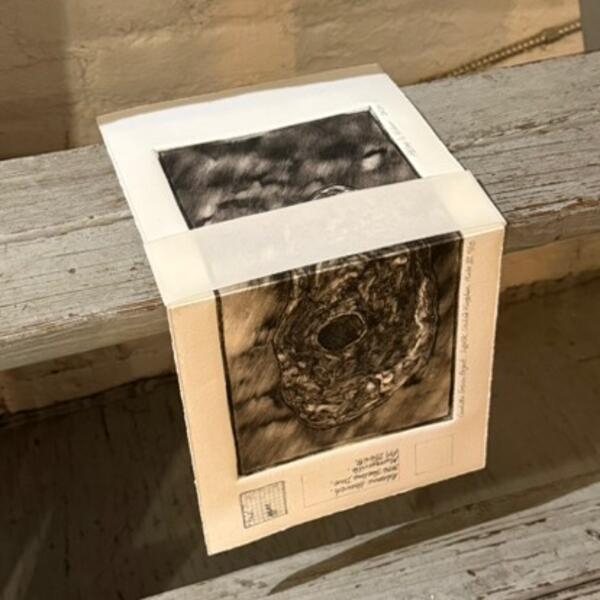 Mum
Mum
